#ostensibly form a relationship
Explore tagged Tumblr posts
Text
Again again thinking
#like am I asexual or do i just fear physical intimacy because of my assault#like I have desire I experience arousal#hell I fucking love smut#but whenever I’m with a girl#like going on dates recently and even with my exes#I haven’t actually felt physical attraction to them#and the couple of times I tried to ignore that and make out or have sex#I would freeze up and dissociate#or have a panic attack#or just physically feel nothing when being touched#it’s really confusing#because also the two times I’ve developed actual feelings for someone it’s only been after knowing them for 2+ years#and I’ve been physically attracted to those two people#so like okay I think the biggest most obvious issue here is that I have not been attracted to the people I’ve been intimate with#but I desire physical intimacy so I try to engage in it anyway#and then the ptsd enters the room and complicates things further#and this is why dating is so exhausting#because even people that say they want to take things slow don’t really fully get what I mean#but I also understand not wanting to continue getting to know someone that is not attracted to you when you went into this to#ostensibly form a relationship#what does annoy me is when they respond to my honesty about not being attracted with#‘I’d love to keep getting to know you as a friend’#and then never talk to me again#like come on please just be real with me#I desire intimacy but can’t mentally or physically do casual hookups#and at this point I think I might give up on dating because it’s actually so draining#I think the only way for me to meet a potential partner is to keep making new friends and see what happens#but I don’t have energy to do anything or go anywhere outside of work#so I guess I’ll just be a spinster with a diverse sex toy collection and a Zoloft prescription
3 notes
·
View notes
Text
Oh also am I being a tad reductive when talking about the quadrants? Yeah absolutely. But I do think it's important to see what the comic actually says and demonstrates about relationships within these frameworks, rather than trying to find like. Some platonic ideal of a "TRUE" romance, or trying to figure out how the quadrants are actually *supposed* to work.
Like. We're supposed to take Meowrails as the platonic (no pun intended) ideal of a moiraillegience. They are quite literally used as The Symbol for it in comic (their typing quirks forming the <>).

And when we see their initial relationship online, it is... not great to say the least!
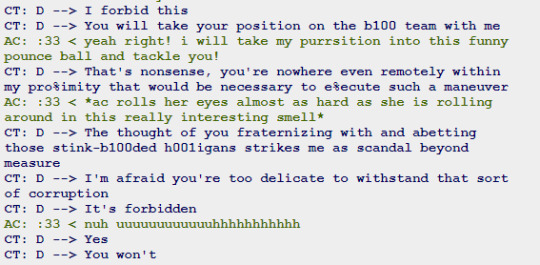

Equius is domineering and dismissive of Nepeta's agency, and is very explicitly *keeping her away from her friends* in this game, and keeping her with him, ostensibly for protection, a thing he does an awful lot despite Nepeta clearly being very capable (see him keeping Nepeta from FLARPing with the other teams. Even if that, in universe, may have been a good idea.)
And even though we do see softer moments between the two of them, and their relationships seems to have improved by the time we reach [S] Equius: Seek the highb100d, this is one of our FIRST demonstrations of a pair of moirails in the comic, designed to be indicative on the concept. In our other examples, Vriska seems barely cognizant of the idea that she's even IN a relationship with Kanaya to begin with, and it falls apart due to the boundaries between pale and red romance (boundaries that, like the human boundary between "friend" and "lover," are artificially constructed); Karkat and Gamzee failed so horribly that Karkat gives up, and it fails to prevent Gamzee from enacting more violence on Terezi; Feferi finds it utterly exhausting to constantly be preventing Eridan from committing violence, and rightfully breaks it off with him; and finally, Terezi is unable to prevent Vriska from inflicting a final and great violence upon herself at the end of the comic, especially when she wants clearly to be Vriska's everything.
For kismessitude, I keep seeing people groping around in the dark for what a True, Healthy Kismessitude is, and I really hope I don't have to tell you that you shouldn't build a relationship off of mutual hate. Our key example given for black romance is, well.

A relationship that literally always ends up with one member murdering the other. In both universes.
Also notable is that we almost never see a kismessitude where there *isn't* some significant power imbalance between the two parties. The Black Queen is Jack Noir's boss, Equius literally designs Aradiabot to be utterly subservient to him, and Gamzee specifically uses Terezi's disability and insecurity to trap her into a relationship with him.
A healthy rivalry or making fun jabs at each other is one thing. But a system is what it does, and kismessistude consistently produces abuse and often fatal violence between two people. The only one that ends without that violence is Eridan and Vriska. And that was just because Vriska didn't really care anymore.
Auspisticism is pretty rare in the comic, and even most of the characters don't seem to have a very strong grasp on the subject. Our example is... Kanaya auspisticizing between Vriska and Tavros.
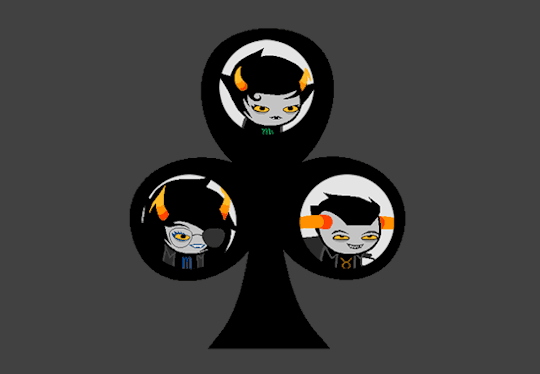
Which mostly just feels like Kanaya is trying to stop Vriska from picking on Tavros, not facilitating a relationship.
Kanaya is kind of our Key Person here though, being described as "the vvillage twwo wwheel devvice" by Eridan when he is trying to proposition her to auspisticize between him and Vriska. It's a mediative position, that seems to mostly be used in attempts by Eridan to make women talk to him (getting Kanaya to mediate between him and Vriska, trying to get Feferi to mediate him and Sollux, both times unsuccessful because, again, they don't care.) It also exhausts Kanaya, she doesn't like it, and she's not very good at it, if there even is a good state to be in for auspisticizing, as anyone who's had to deal with polycule drama knows.
Ultimately, it's a way to offload the emotional baggage of a toxic relationship, either extant or imminent, onto a third party (always a woman for some reason! Funny that) because Alternian relationship structures seem designed to encourage violence and aggression for the purposes of imperialist expansion.
The REAL point where it matters is when Rose starts to get into Auspisticism, and we start to see when it can really go wrong.

During Game Over, while Gamzee is ACTIVELY BRUTALIZING TEREZI, Rose, who has been talking to both parties and trying to auspisticize, freezes.

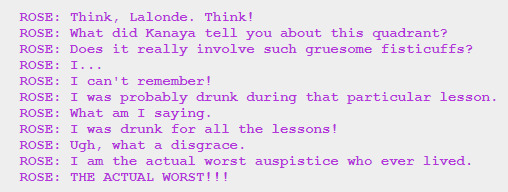
Trying to understand this framework as an extant thing is actively causing her to undergo analysis paralysis. She sees, obviously, brutal violence being inflicted on her friend, but because she has positioned herself as the mediator of an obviously abusive relationship, the maintenance of this relationship is suddenly a priority in trying to navigate it. Her fear of getting in the way of what could be a "normal" relationship loses her precious seconds that may have ended up costing lives.
This sort of thing happens all the time. When you see a relationship as an object and a structure whose preservation is worth striving for, even when there is nothing to be gained by maintaining that relationship, it can leave you trapped in abusive and toxic scenarios. On Earth, the preservation of marriages beyond the point where one or both members of the contract get anything positive from it causes devastating unhappiness, inequality and abuse. The preservation of these structures has a purpose.
In America, as well as many other countries on Earth, the purpose of the institution of marriage is largely to put reproductive and financial power in the hands of men, and to construct the nuclear family along the lines which maintain structures like Christianity, capitalism and patriarchy. That has just historically been the case. Does that mean that no one should get married, or that no one can be happy in a marriage? Of course not. But people didn't fight for things like gay marriage, and are still fighting for marriage equality for disabled people and other groups, just for the sake of being "normal." They did it for a lot of reasons. Hospital visitation rights, the ability to have some say in what happens to their partners after death, insurance sharing.
But as the institution of marriage is expanding to include more people, we should really start questioning why these sorts of things are locked behind a contract that also assumes A Lot Of Things about two people that may not necessarily be true, i.e. a desire to live together, have sex, reproduce, share financial interests etc, when a more holistic approach to relationships where they aren't simply All or Nothing is going to make a lot of people a lot happier.
There's a couple of specific phrases in wider Homestuck Fanon that always bothered me. Those being that a relationship "is beyond or transcends quadrants" and that someone wants another person "in all four quadrants." Partially because it always seemed to just describe two people who really really love each other a lot, semantically similar to us calling something True Love but I digress. Like, in an ideal world, most relationships would transcend quadrants! Individual aspects of each type of relationship that are usually cordoned off should be available for you to pick and choose. The lines between a friend and a rival and a lover should be obliterated, but it's said instead to indicate when someone is No For Real In Love, when usually it's just two people who are human dating. There's a good swathe of people who seem to think that all the quadrants are bad EXCEPT for red which is the Normal Human Way Of Being In Love and is therefore good. I mean, this is kind of the whole thing the Candy timeline is based around, right? Everyone cordoning themselves off into neat little marriages, having babies and living in suburban houses with white picket fences.
And we all know how well that's going.
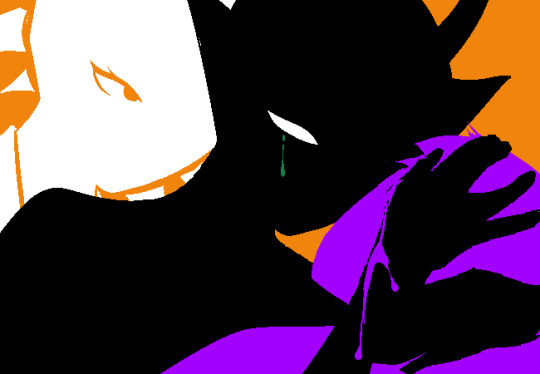
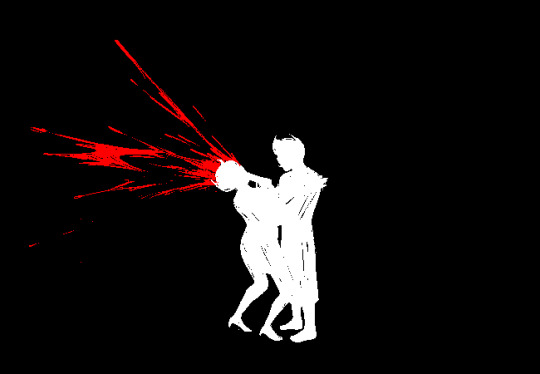
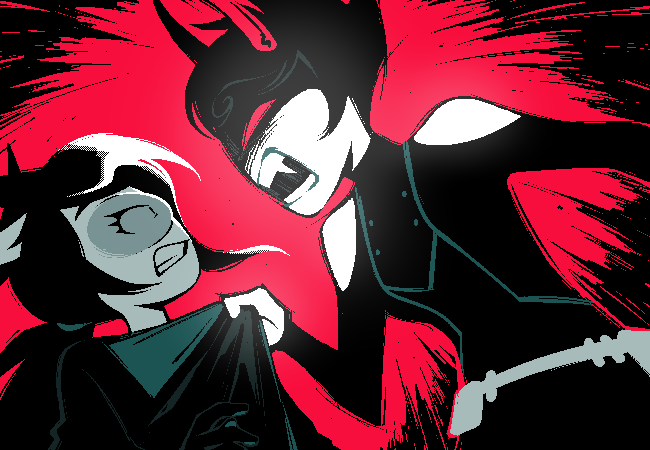

#long post#flashing lights#whooo this was a doozy.#anyways i think john and roxy getting a divorce and still being pretty amicable and. okay? ish to a degree#is indicative
162 notes
·
View notes
Text
me and den @unloneliest were just talking about murderbot and ART's relationship and i want to discuss how they quite literally complete each other's sensory and emotional experience of the world!!
there's a few great posts on here such as this one about how murderbot uses drones to fully and properly experience the world around it (it also accesses security cameras/other systems for this same purpose). but i haven't seen anyone so far talk about how once MB stops working for the company and consequently doesn't have a hubsystem/secsystem to connect to anymore (which for its entire existence up to that point had been how it was used to interacting with its environment/doing its job), after it meets ART, ART starts to fill that gap.
ART gives MB access to more cameras, systems, and information archives than it would normally be able to connect with while MB is on its own outside of ART's... body(? lol), but also directly gives MB access to its own cameras, drones, archives, facilities, and processing space. additionally, so much of ART's function is dedicated to analysis, lateral thinking, and logical reasoning, and it not only uses those skills in service of reaching murderbot's goals, it teaches murderbot how to use those same skills. (ART might be a bit of an asshole about how it does this, but that doesn't negate just how much it does for murderbot for no reason other than it's bored/interested in MB as an individual.)
we all love goofing about how artificial condition can basically be boiled down to "two robots in a trench coat trying to get through a job interview" (which is entirely accurate tbh) but that's also such a great example of ART fulfilling the role of both murderbot's "hubsystem" and "secsystem", allowing it to fully experience its environment/ succeed in its goals. ART provides MB with crucial information, context, and constructive criticism, and uses its significant processing power to act as MB's backup and support system while they work together.
from ART's side of things, we get a very explicit explanation of how it needs the context of murderbot's emotional reactions to media in order to fully understand and experience the media as intended. it tried to watch media with its humans, and it didn't completely understand just by studying their reactions. but when it's in a feed connection with murderbot, who isn't human but has human neural tissue, ART is finally able to thoroughly process the emotional aspects of media (side note, once it actually understands the emotional stakes in a way that makes sense for it, it's so frightened by the possibility of the fictional ship/crew in worldhoppers being catastrophically injured or killed that it makes murderbot pause for a significant amount of time before it feels prepared to go on. like!! ART really fucking loves its crew, that is all).
looking at things further from ART's perspective: its relationship with murderbot is ostensibly the very first relationship it's been able to establish with not only someone outside of its crew, but also with any construct at all. while ART loves its crew very much (see previous point re: being so so scared for the fate of the fictional crew of worldhoppers), it never had a choice in forming relationships with them. it was quite literally programmed to build those relationships with its crew and students. ART loves its function, its job, and nearly all of the humans that spend time inside of it, but its relationship with murderbot is the first time it's able to choose to make a new friend. that new friend is also someone who, due to its partial machine intelligence, is able to understand and know ART on a whole other level of intimacy that humans simply aren't capable of. (that part goes for murderbot, too, obviously; ART is its first actual friend outside of the presaux team, and its first bot friend ever.)
and because murderbot is murderbot, and not a "nice/polite to ART most of the time" human, this is also one of the first times that ART gets real feedback from a friend about the ways that its actions impact others. after the whole situation in network effect, when the truth of the kidnapping comes to light and murderbot hides in the bathroom refusing to talk to ART (and admittedly ART doesn't handle this well lol) - ART is forced to confront that despite it making the only call it felt able to make in that horrifying situation, despite it thinking that that was the right call, its actions hurt murderbot, and several other humans were caught in the crossfire. what's most scary to ART in that moment is the idea that murderbot might never forgive it, might never want to talk to it again. it's already so attached to this friendship, so concerned with murderbot's wellbeing, that the thought of that friendship being over because of its own behavior is terrifying. (to me, this almost mirrors murderbot's complete emotional collapse when it thinks that ART has been killed. the other more overt mirror is ART fully intending on bombing the colony to get murderbot back.)
in den's words, they both increase the other's capacity to feel: ART by acting as a part of murderbot's sensory system, and murderbot by acting as a means by which ART can access emotion. they love one another so much they would do pretty much anything to keep each other safe/avenge each other, but what's more, they unequivocally make each other more whole.
#the murderbot diaries#murderbot#asshole research transport#network effect#mine#idk what else to tag lol#BIG thanks to den unloneliest for helping so much with the drafting/editing of this!!!#we both were having some brain fog issues yesterday so we joked that with our combined forces we can make one (1) post lol#just like mb and ART fr!!!!#anyway im so fucking emotional over themmmmm#murderbot meta#the murderbot diaries meta
749 notes
·
View notes
Text
Selfish

Pairing; Yandere Leon Kennedy x reader
Synopsis; You escape your captor during one of his many missions. You stop by a diner searching for help. What will happen next? Find out by reading
Word count; 3.8K
TW; Kidnapping, non-con touching, Stockholm syndrome, maybe just a tad bit ooc, Yandere (obviously), obsessive behavior, cussing.
Notes; hopefully you enjoy reading. It’s not the best since I’m still maturing as a writer and because of my hiatus; but I hope you enjoy.
!Reblogs and Comments are greatly appreciated!
Sapphire-embellished twilight transitions into dawn’s light blue hue bringing alongside the sun. Birds sang good morning to one another, on their side of the forest. You ambled down the road that ceased the strong odored forest from connecting.
You stared at the endless road up ahead. Night to morning, ahead of you was forest and road. Perhaps this reason is why your captor moved into the isolated forest since raccoon city incident.
Or maybe he wanted to live a life of normalcy given the opportunity; the monsters he claimed he fought, seemingly every month, stressed him greatly and you noticed. Plus, he mentioned he needed a vacation frequently.
You pause, double-checking onward on the ostensibly never-ending road. Was your hard work a waste of time?
Looking back on the way he treated you, you pondered if it would have been smarter to stay home. Most days he wasn't overbearing. Once in a while, he’d annoy you, other than that he was tolerable. Besides being unable to leave the house unattended and having no say in choices at times, he gave you more freedom than most.
But then you remember the day before. At the crack of dawn, he’d left for a mission: bidding you goodbye with a note and breakfast at your night table side. You were left all alone, so naturally you sought a form of entertainment.
The television; Which was your only option.
You were clicking through the television channels when you came across a crime documentary. The story was similar to your personal life so you continued to watch the channel.
The story was about a woman, age twenty-three, who was kidnapped for around four years. During her kidnapping, she fell deeply in love with her kidnapper to the point they had to detach her from the cop car when they arrested him.
In your situation, you’ve been abducted for at least eight months. Her situation only took a year till she developed Stockholm syndrome.
Clarified by the show as the psychological condition of a victim who identifies with and empathizes with their captor or abuser and their goals.
Learning this information a thought came to mind.
Would you become like her once it hits New Year's? Loyal to a man that took you away from society. No. You refused to allow the same situation to happen to you.
You’d never allow it to happen.
When it came to the relationship your captor so desperately longed for with you, you caused many difficulties to prevent any form of romance.
Any attempt at affection had him pushed away or smacked. Discussion about the past before your absconding was simply ignored. And in general, you kept your distance from him. Well, at least you tried to. He stays at your hip like a lost puppy majority of the time he has off work, talking your ear off. There was no way in hell you’d fall for him. Not after the months you spent in that isolated house.
Regardless of how certain you were, you mulled over it some more. You finally concluded running. So far, you felt regret and relief.
Out of nowhere, a loud reverberating sound of a car grew closer, arising behind you. You quickly spun around to see what the sound originated from.
The engine growled, sending a ping of fright to your heart. You spent no time thinking about Leon’s reaction to your escape. However, now your mind consumes thoughts of his response.
Could your captor's fury be so robust that the car in the distance embodied his rage? Knowing him since your best friend introduced you to the man becoming a rookie cop in raccoon city; you’ve never seen him enrage.
From time to time his witty replies and mean scowl would showcase his anger. Of course, that didn't mean his rage wasn't feasible. But never had you ever witnessed a stronger emotion from him.
Inching closer, you were able to discern the details of the car. It was a massive black car, with tinted windows. A car your captor might arrive home with after a mission. It announced its presence with its vociferous roaring.
You observe with dread blooming in the pit of your stomach, every other part of your body tingled.
Although the person driving the car was yet to be revealed, you were petrified, stuck in place like you had been glued onto the concrete below you.
It must be him.
Why else would they be heading so fast toward you?
Already, you’re willing to surrender. Your captor is a forgiving person when it comes to you, so there’s a likelihood he’ll forgive you if you cooperate.
Standing on the side of the road, you acquiescently wait for the car to stop. Waiting for him to take you back to your prison.
The car slows but even then it's at a fast pace. The car passes you momentarily. Slightly it reverses until the passenger window is in front of you. Unhurriedly, the shadowy window rolls down. In the driver's seat, instead of who you believed it to be, it was a woman.
She looked to be in her middle thirties. She wore black sunglasses in her strawberry-blonde hair, a red blouse with denim jeans. Her makeup reminded you of Jennifer Tilly in Bride of Chucky, but she wore a sweet smile.
“Oh my lord, are you alright darling?” The woman asked like you were a child outside without a jacket in the freezing winter.
You continued to stare at her. You wanted to say something, but your throat felt drier than sandpaper. You opened your mouth, wheezing a bit as you sipped the fresh air. “I don't know,” you responded as loud as you possibly could. So barely above a whisper.
“Do you know where you are?”
“No.”
“Are you safe?”
“I’m not sure yet.”
The woman shook her head disapprovingly, then she began to throw whatever laid in the passenger seat into the backseats. “Come on sugar, get inside. I’ll give you a ride.”
“Okay, thank you.”
She reached over and pushed the passenger door open. You entered the vehicle, settled in, and got comfy. You buckled in making sure you heard the reassuring click.
“There you go,” she commented with a smile. “Now, we're going to make a stop by a gas station, then we’ll find out what we can do with you. Is that alright?
You smiled back, “Yeah, I don't mind.”
The car began to ride forward and the air conditioning blew on your overheated body. You relished the cold air. You hadn't realized how hot it had been outside, even in the early morning. Where were you?
You put that thought aside. Now you needed to worry about something to drink and eat.
“Do you…have anything to drink or eat?” you glanced at the woman.
She nodded. “Of course sweety! Why didn't I offer before?” she looked away from the street to grab a half-empty bottle of water from the side of the driver's door. “Sorry, that's the only drink I have at the moment.” she apologizes.
Without a second thought, you unscrewed the cap off the water and chugged the water. Water had never tasted so refreshing before. It was like you’d been roaming in the desert for hours on end and finally found a source of water.
The woman glances at you. You must have looked crazy. “How long have you been out there?”
“Since eight last night.” You sounded better. No more raspy voice that hurts you to speak. “I should have packed a bag but something came up.”
Before you left the house last night, you weren't in your right mind. Your captor never gave you an exact time he’d be home. His return ranged between the eight at night, the dead of night, the crack of dawn, or the morning. Recently, he’d been arriving home at eight. Which is the reason you left with nothing. Looking back, you had no confidence in yourself at getting away. You believed you were going to be caught in a matter of ten minutes. Now look at you.
You turned to the woman, “Thanks…” She finishes the sentence with her name. “Amanda.” You nod rephrasing your sentence, “Thanks Amanda for picking me up.”
Amanda smiles again, this time wider showing off her pearly white teeth. “I couldn't just leave you out there. Now, what’s your name?”
You tell her your name and hope she somehow knows it. Maybe the news reported you missing when you weren’t watching. You hoped so.
Rather than freaking out, realizing she had found a missing person, she simply responded with a “nice to meet you.” You died a little at the rejoinder.
Did no one care enough to report your absence? Not your family or close friends, no one attempted to reach out to the police?
No. You’re just overthinking. Not everyone watches the news or actively looks for missing people. You just had to be around more people. Someone was bound to know your identity.
Still, you can’t ignore the way your hands shake at the thought of being forgotten.
“So what were you out there for? If you don’t mind sharing that is.”
You bit the inside of your cheek. What were you to say? Tell her the truth and find out she was with your captor the whole time or keep your mouth shut and have no help in case he does find you.
A white lie would help.
“Escaping my abusive boyfriend.”
A frown pulled at the woman’s plump lips, her eyebrows scrunching together at your answer. “Do I need to the cops, family members?”
“No,” you responded quickly and harshly. The car fell silent. You took a small breather before speaking. “No, thank you.”
“Please, tell me, is there anything else I can do to help you any further?”
You needed cash, shelter, and a job. There was only one thing you were sure she could help you with. “ I need money and a hotel.”
“Don't worry, I got you covered,” she said softly.
The car began to slow when she placed her foot on the break. She turned the car and moved into a spot that contained a combination of a gas station and an old fashion diner. She parked the car next to a gas pump, then powered it off.
She dug into the middle counsel, pushing around pens and important items, and pulled out a pink wallet. She unzipped the front zipper and pulled out some money.
Amanda held the cash out to you, “Here’s 100 dollars. There's enough for lasting food, a hotel to stay, and a bus.”
You unbuckle your seatbelt just to hug her tightly. “Thank you!” you repeat over and over, like an unanswered prayer. She returned the hug, telling you she didn't mind lending you some service. The hug ended and you needed to plan your next move. What would you spend your money on first?
Well, all you knew was what you’d spend what was given to you on something important.
You looked out the window. Your eyes shift toward the diner. Mo’s dinner was on the sign, “been here since the ’50s.” which was written below.
Right. Food. You haven't eaten since yesterday. Walking as long as you did, you tried to forget your hunger and focus on the main goal of finding shelter or at least some safety.
“I think I’ll have myself a hot breakfast!” you announced. Amanda unlocked the passenger door, “go right ahead. Enjoy your freedom.” You nod, fleeing the car akin to a little kid whose mother gave them money for an ice cream from the ice cream truck.
The entrance bell chimes when you open the door to the cream-colored establishment. Once inside, you settled yourself in a booth in the far back. An old jukebox plays aged music ranging from the 70s to the ’50. Besides you, there was a single person in the restaurant. A man at the bar sipping his morning coffee whilst reading the newspaper.
You extend your arm over to the menu across the table. The menu displays numerous appetizing dishes, varying from breakfast to a juicy steak dinner.
Flipping the page your eyes landed on a mouthwatering breakfast sandwich, including bacon, egg, and cheese.
“Hello ma’am, I’m Stephanie, I’ll be serving you this morning. What would you like?”
You placed the menu aside to give the waitress your whole attention. The woman was of average height, wearing a pink uniform that reminded you of the 50s. She wore a smile that did not reach her black doe eyes. “Did you hear any of that?”
“Yeah, I’m sorry,” you said sincerely, feeling anxious about possibly pissing her off. “Could I have a number six and a sweet tea?”
“Of course, is that it?”
“Umm…yeah, that’s it.”
“Alright then,” she replied disinterestedly. She left quickly, retreating to the kitchen.
You continue gazing at the closed door to the kitchen. What else could you do? You should have brought along something to entertain you, then again there wasn't much back at the house you called a jail cell. For the remainder of the waiting duration, you’d have your thoughts to amuse your lethargy.
Ding Ding
Instinctively, your head turned. 50s music began to fade, superseded by the loud thumping of your heart. Your breathing became shaky, parallel to your hands. Dirty blonde hair is what you see first. It’s him! You repeat in your head, like a religious prayer.
“Jessica, hey!” you heard a joyous exclamation. You watch as the man from the bar rushes over to the person entering the restaurant. Your anxiety left as quickly as it came. A hand places itself onto your cheat, and on the spot your heart thumped rapidly. You had to calm down. You took deep breaths, and your heart slowed with each sip of air. You rest your head on the table.
After taking the time to calm yourself, you analyzed the restaurant furthermore. Now, the place was vacant, since the man had left. Fifteen minutes passed and you found a newspaper from the newspaper rack adjacent to the front entrance.
Nothing in the article was new to you. At your captor’s home, you watched the news almost once a week to see if anyone had reported your disappearance. Nothing ever came up though. At least you were up to date with everything going on.
Your waitress finally returned, carrying your meal on a maroon-colored tray in her left hand. “Sorry for the wait, ma’am. Kitchen malfunction.” she apologized, giving you a guileless smile. This would be the only expression besides tedium that you’d receive from her.
“It's alright,” you said, watching as she placed the food on the table for you to dig into. She left carrying the tray back to the kitchen she emerged from.
You took a bite of the sandwich, chewing slowly to savor the flavor. Juicy and delicious are solely vivid words to illustrate the taste. The egg had a spongy texture that combines well with melted cheese. And the hickory bacon wasn’t too crispy or chewy, it was simply perfect.
Back at the prison, your captor wasn't the best cook. But he tried to be for you. Still, you preferred takeout. Chinese, Italian, and burgers began to become a boring taste on your taste buds. Having a breakfast sandwich was refreshing, to say the least.
“Enjoying your meal, huh?” rough voice inquiries. The question was said cockily but their wrath was audible in the way the last word was spoken.
You stop mid-chew, the overwhelming flavor vanishing from your mind. It now tasted bland. You kept your eyes shut. Were you afraid? No. Afraid couldn't explain the ineffable amount of dread you felt at the moment. Ruffling could be heard on the opposite side of the table; He was sitting down. Your eyes open involuntarily like your body already knew what he wanted it to do.
Across the table, seating snugly is your captor; Leon Kennedy. He looks rougher than the last time you’ve spoken. The dark circle underneath his eye has grown darker. His brunette roots have begun peaking out ruining his natural blonde facade. And he looked exhausted. Must have stayed up all night looking for you.
He looked more than pissed. He appeared disgruntled. Compared to Leon, you were small. But now, Leon was like a giant towering over you. Despite never abusing you in any shape or form, your body shakes like a leaf in the wind. The way he glares down at you drives you to shift uncomfortably in your seat.
“Do you know how long I've been up for, y/n?” he asks whilst pulling out a flask from his jacket pocket.
Regardless of how parched you are, you force yourself to converse with him. “No,” you're voice is brisk and faint.
“Two days. For two days I’ve been on my feet.” He takes a swig of the flask and then continues to rant. “I could have joined you in bed and fallen asleep, but there was a problem. You weren't anywhere.”
He shakes his head, pinching the bridge of his nose. “What the hell is the matter with you? You could have gotten hurt. You probably are.”
Leon is getting angrier, you can tell by the way the furrowed eyebrows deepen and his frown morphs into a glower, as he utters each sentence.
“I’m sorry.” That's all you can say. It's all that comes to mind.
“Sorry won’t make up for the scars you've gotten.” he retorts angrily.
Now you're mirroring his expression. You’re angry and tired as well. Definitely not as tired as him but still tired. “You’re acting as if I didn't have a good reason to run.” you petulantly cross your arms, akin to a child not getting a toy from the store.
Leon wasn’t delusional. Back in the day, when he was a rookie cop, in some aspects he was delusional. However, as the years continue to pass so does his past self. Leon understands what he has done to you is inhumane, but he can’t help it. He kept you locked away for a reason. You won’t get hurt with him by your side.
Leon sighs, closing his eyes and leaning closer with his forearms on the table. “I know, I know.”
You tilt your head, “really? So, why are you mad at me?”
His eyes open, displaying icy-blue orbs. They hold Empathy in them. Empathy Leon has a difficult time communicating to you.
“I keep you in the house for your safety.” He began, taking your hands into his own. “To keep our relationship safe.”
“But I don’t want a relationship with you.”
“I know.”
“So why are you forcing me to stay with you?!”
Leon’s hands squeezed yours, provoking a cry out of you. “All my life I’ve been a generous man. I saved many and gave up my life for others. I’m always providing for someone else and rarely caring for myself. And the one thing I yearn for to the point I was convinced I deserved it. It was you.”
For a beat, he ceases his gabbing. Leon stares down at your connected hands, his thumb starts rubbing against the back of your hand. It’s a domestic act that earns your displeasure.
“For once, allow me to be selfish,” he mumbles, eyes slowly trailing up to meet yours. His lips press your hand, giving it a chaste kiss. “You’re the only thing I’ll fight to keep for myself.”
Part of you wishes the relationship was normal. Leon truly did care for you, and you still cared for him, But he did something unforgiving. He took away your free will.
“...you can’t just steal a person, Leon. You can’t expect me to love you.”
“I don’t.”
“So why won’t you let me go? You still have Ada, don’t you? You were more into her than me. Why isn’t she in my position?”
“Because I love you, not her. You haven't betrayed me. Well, not until now.” he jokes, letting out a faint chuckle.
Leon pulls out his wallet, his fingers sliding through the pockets to find his card. “Wrap your food up. We’re leaving.” he puts his wallet back in his back pocket, “Be right back. Stay here.” he commanded sternly.
The waitress is at the bar, cleaning the counter with a blue rag. Leon approaches her with an “Excuse me.”
Leon put too much faith in you because you were on your feet immediately when his back was turned. You quietly inched towards the door and ever so slowly dragged the door inwards. Leon was distracted, the waitress deciding she’d flirt with him despite seeing you and him together. You manage to slip through the door before Leon notices your second escape attempt.
You bolt out the door when you hear the enraged roar of your name from behind. You grip the railing to the stairs, running down them, tripping a couple of times. You don’t look but you know Leon’s on your tail. The door slams against the wall, the bell ringing loudly.
“Y/n, get back here!”
Amanda’s car was still parked by the gas pump. You sprint towards it, slipping through the tight space of the car and the gas pump. Luckily for you, Amanda was in the car, applying her strawberry-pink lipstick.
“Amanda!” you shout, startling her enough that she drags the lipstick across her cheek. She shouts, frightened by your sudden appearance. She looks at you, like you're crazy. She says your name to clarify the person at her window, “What are you doing.”
You shake your head, “yo-you gotta help me, he-” you say breathlessly.
“Hey, Amanda.” you hear Leon’s voice call out. Unlike you, he isn’t out of breath. Thanks to his military training. Amanda peeks her head out the window, she smiles waving at Leon. “Hey, Lee!”
Your eyes widen till it’s physically impossible to widen anymore. She knows Leon. Your body feels numb as you watch them interact like old friends. You feel like you aren’t real at the moment. Like you're watching the scene unfold outside your body.
“Sorry, she just came back from the hospital. She isn’t in her right mind right now.” Leon excuses, leading you to his car like a shepherd's dog guiding the sheep to its pen.
Amanda nods as she understands completely. “No worries, I’m just glad I found her before she hurt herself.”
Leon puts you in the passenger seat and closes the vehicle door. The keys lock the door from the inside, so you are left choiceless.
Leon joins you in the driver’s seat, definitely too angered to chide you. He seethed quietly, powering on the engine with the quick twist of the car keys.
Wordlessly, you buckle up. You wouldn’t make an endeavor to anger Leon any further.
You’d allow him to be selfish. Allow him to have you.
What other option did you have now?
#Leon Kennedy#Leon Kennedy x reader#yandere resident evil#resident evil#resident evil 4#leon s kennedy#yandere leon kennedy#yandere themes#yandere writing#dilfartist
1K notes
·
View notes
Text
Welcome new Transformers fans!
You might have seen this Don't Make Me Tap The Sign meme floating around. Transformers One has been out for a little while now so I want to expand on it as well as some other TF fandom things.
What does "Transformers doesn't have a set canon" actually mean?
Essentially, every new Transformers story is a reboot. They might draw from or expand on concepts from previous iterations but canonically each continuity family is separate. This means all lore is extremely flexible - origin stories, relationships, even personalities can change wildly between iterations and while some may be better or worse than others, they are all equally canon.
For example: Orion Pax was a dock worker in G1, an archivist in Prime, and a miner in TF One. None of these contradict each other.
Continuities also tend to share ideas without being directly connected. For example Transformers One draws from Transformers Prime in multiple ways (e.g. it features Airachnid) but it is not a prequel to Prime and in fact directly contradicts it. Yes I know there's a guy on xitter claiming tfone is a prequel to the Bay movies but he's wrong.
What is a continuity family?
Most storylines include tie-in novels, comics, video games, and other shows that all share the same canon.
The Aligned Continuity is the most well known. It consists of Transformers Prime, Rescue Bots, Rescue Bots Academy, Robots in Disguise 2015, multiple video games, and some tie-in novels and comics. They are all ostensibly set in the same canon... except the Aligned Continuity is inconsistent so even its lore is loose :')
My point is that while every continuity is separate, some shows are connected.
(Sorry if this is confusing. It is confusing. You get used to it)
What about fanon?
The Transformers franchise is old enough that a lot of fanon has become so pervasive it exists in a sort of nebulous space where it feels like it could be canon or at least become canon once enough fans are working for Hasbro but essentially: oh boy is there a lot of fanon
For example: seeker trines, doorwing speak, the Unicron Singularity and all forms of robot sex (sorry) are fanon, but they appear so often in fanworks that it's easy to get confused (I know I do!)
It's safest to assume something isn't canon unless you've seen it in a show (and even then, it may only be canon to that particular show)
Can I mix-and-match in my own fanworks?
Absolutely! It's very common for creators to set a story in one continuity but transplant a character from another, or use a different backstory, or borrow whole plot points from different canons. Chop up that lore and make a delicious continuity soup.
So why is this important?
It is very, very, very, very, very frustrating to be "corrected" about something that isn't relevant, or to see someone critisize a show based on lore that doesn't apply, or to have a character be called OOC when they're not, etc. I think a lot of fandom slapfights could be avoided if more people understood how loose Transformers canon actually is. Do what you want with your own creations but please be mindful when it comes to interacting with other people's.
This is A Lot
You don't have to know everything about Transformers to be in the fandom and have a good time - if you're only interested in TF One that is perfectly alright, you don't need to watch every show and read every comic and play every game to be considered a fan of something.
But if you want to find out more I recommend checking out the TFWiki - it isn't perfect but it gives a good rundown of most general lore as well as details about specific shows.
That's it from me. I hope this is helpful! It's the sort of thing I would have liked to read when I first joined the fandom haha
61 notes
·
View notes
Text
so the thing is, back when i first watched s3 of elementary i was not a fan of joan coming to this moment of "oh maybe i should break up with my stable, attractive, nice, charming boyfriend" only for him to immediately die, because it felt like a cop-out -- that she'd almost come to some kind of moment in figuring herself out, but now she'd be regressing into "oh well, i can't have romantic relationships because it's dangerous, not because i don't want them," there will forever be a tinge of something in her relationship with andrew now, even though she was literally in the process of breaking up with him because it wasn't doing anything for her. a certain rose tint over what was actually happening, which was that she wasn't into the idea of the relationship, or indeed, any romantic relationship
however this time around i'm more into it, because this time i'm suuuuch a fan of the continuous push and pull of introspection and refusal to introspect that exist in both sherlock and joan -- getting the emotional truth out of either of them is like pulling fucking teeth!
the fact that the "aftermath episode" of her bf getting murdered in which joan is steadfastly refusing to Feel Her Feelings is the same episode as the sherlock-and-marcus excursion, in which marcus bell is telling sherlock over and over "call me marcus" and sherlock's grimace makes it clear that too much vulnerability feels like getting stabbed, something he's only allowed five times it seems:
two are with people who are locked up (jamie and abigail, although the latter has some serious extenuating circumstances)
one is dead (alistair, and even then i feel like alistair never knew how much he meant to sherlock)
one is on the run from the law atm (kitty, although i know she works that out)
and joan
(and arguably mycroft, but that's slightly different, they're siblings, being a sibling is smthinsmthin)
and even with them -- with the exception of joan and previously jamie -- he is oh so very careful about how much of himself he shows
it's such a fascinating double-up episode exploring their attitudes towards relationships (the fact that jamie makes a form of appearance and it's via writing a letter to joan!!!!) (also ofc sherlock calls him marcus by the end)
and now back to joan, who is ostensibly much more "adjusted" to living a conventional life, after all she's prepped for conventional since she was a kid! except she really isn't, is she? she's canonically trying to fulfill some assumed goal of normalcy (stated to be expected of her by her mother/upbringing), and she's fighting against it every step of the way. she doesn't do close friendships really (she tried, and she sucked at it until she started meeting people more like sherlock, and then it's a little closer to the way he does "friendships" that is, we create a wide network of people, but we don't have to know that much about each other beyond what we need to support one another), and she certainly doesn't do romance (or, she tries for a bit, but fails over and over) and the entire time she's insistently going "sherlock you need support to figure yourself out, you need some help to stay sober, if you want to talk..."
her whole Thing is that she's very polite and charming, so of course she's not like her standoffish abrasive partner, sherlock, she's the "Nomal One" who's so well-adjusted, except when this life forces her to make decisions beyond her control
and now going "well, i'm dangerous to get close to, so i may as well not try anymore" is another wonderful way to avoid thinking about what she wants. she doesn't have any choices you see, it's simply the way things have to be (oh noooo). anyway this interaction suddenly happens halfway through the episode:
joan: you know i pulled away from you last year because uh… i felt myself sucked into this world that you built. i wanted something normal. something that was mine. sherlock: there's nothing wrong with that. you have a right to your own space, physically and mentally joan: im not sure that i do. i don't think i can keep our work and my private life separate. it just doesn't seem possible. but you already know that, i mean it's part of the reason you life the way that you do sherlock: yes but my choices dont have to be your choices watson joan: it might be better if they were. andrew would have been better off
see, andrew would have been better off, that's what the problem was, suuuuuuure. girl you were in the middle of dumping him when he was murdered, stop avoiding the real issue here! you shouldn't not-be-dating because of The Work, you should be not dating because you... don't want to. you've got to admit that you like the world you were getting sucked into. do it!
(once she's made the change to wearing suits, we know she's started to sort herself out, it's coming, she'll get there)
end of the episode:
joan: i feel... ok. i feel clear about something: our work, what we do... it's not just a job now, it's who i am. i'm a detective, i'm ready to embrace that. i live in this world - your world - and i probably will for the rest of my life sherlock: it isn't my world. it's our world joan: i understand that now. i accept it, i know what it means sherlock: and what does it mean? joan: it means that... it's ridiculous for me to think that... i can have a normal life. i'm not gonna do that anymore.
joan i want to study you like a bug!!!!!!!!!!!!!!!!!
(but also, youknow, if it's getting her there, then let her think it's the detective work enacting upon her life like an unstoppable force that she must stop fighting and accept the inevitability of. youknow. that's an aromantic way of looking at things too. can't do romance, oh so unfortunate, but The Work!!!!!!!!!)
#joan watson#sherlock holmes#elementary#elementasquee#cbs elementary#aro joan#jamie moriarty like: i know what you are
60 notes
·
View notes
Text
c3 has certainly been the least satisfying campaign so far, but the interesting thing about that is that i don't think you can point to any single point of failure and say "there, that's where it went wrong." it's been more of a death by a thousand cuts. this is going to be criticism, but very broad strokes from a narrative perspective.
first off: to try and play out a campaign with such monumental stakes is already quite ambitious, and unfortunately the player characters for this campaign were exactly the wrong mix for dealing with divinity. bells hells never really had a reason to do the right thing; vox machina's story was very clear cut good-and-bad, along with the personal investment of seeing their homes and people they care about under threat. the mighty nein floundered at times, but had enough self motivated and strongly opinionated characters with outside ties to keep the game moving even when they weren't sure where they were going. molly's death also galvanized them to Give A Shit about consequences and what was going on around them in a way they hadn't before.
bells hells, on the other hand, has never had any personal stake in any of this; laudna, chetney, ashton and braius are functionally alone in the world, with nothing to fight for and no close relationships to see threatened. (sure, braius is ostensibly a paladin of asmodeus, but sam himself has admitted he's not good at staying committed to evil characters. i appreciate the intention behind bringing a religious character back into the campaign after fcg's ending, but braius has been flaky, at best, about his loyalties.) fcg was just beginning to forge those bonds when they died. fearne's family is safely squirreled away in morrigan's piece of the feywild, away from consequences, and she doesn't give a shit about her father. imogen only had her mother, who she always kept sort of holding out hope for and keeping at arms length at the same time. aside from her, orym is the only one with emotional stakes in of all this, and even that was more attached to ludinus himself than the larger plot of predathos being released.
ergo, none of these characters except imogen and orym have personal investment in the story they're spearheading. obviously this is accidental; with them going into campaigns blind, there's no way they could have predicted they weren't going to mesh with the plot. in a story like c1 (largely black and white apocalypse scenarios solved by stereotypical hero work) or c2 (some political maneuvering, but, again, straightforward "stop this tyrannical flesh city" consequences) these pcs might've worked fine, but having characters who are not only disconnected from the gods, but from other mortals, means they never really figured out who or what they're fighting for. each of them is too caught up endlessly ruminating over their own isolation; none of them played a character with enough purpose and/or stability in life to really bring the team together for any common goal. fcg, again, almost got there, and their loss re-fractured the team. chetney sometimes steps in, because travis is a player with great instincts, but it would be playing against his established personality to always have him take on this role. no one else has the emotional intelligence or social skills to encourage the others on paths of personal growth, and with the plot essentially being on a timer for so long, there hasn't been room for the sorts of side trips and time skips that both c1 and c2 had to allow offscreen character development to happen. they've been hurtling at their goal for most of the campaign with no opportunity to work on themselves, and it shows. the characters have largely remained stagnant.
then there's the lack of meaningful npcs. this is partially because they've been all over kingdom come, and partially because they've never really committed to being on anyone's side long enough to form bonds with npcs. they have no "home base," no faction loyalties except orym's loyalty to the ashari and fearne's loyalty to morrigan, and again, few personal ties that would easily translate into recurring npcs. given that the purpose of npcs is largely to keep the plot moving forward . . . you can see how the hells have suffered without them.
this next part is going to piss some people off, because it's (gentle) criticism of matt, but it needs to be said. i do not think he should have told this story. i'm not talking about technical ability as a dm, i mean more from a philosophical, anthropological, religiological perspective. exandria is a world the opposite of ours, in which the existence of gods is unilaterally accepted and observable, but their "right" to act as such is now under debate with the revelation that they originated elsewhere, came to exandria, engaged in cultivation of exandria's raw materials, & killed the titans who technically had the "right" to the land but wanted to wipe their creations off the face of the earth. then things devolve into polytheistic dualism, a pantheon of good gods and a pantheon of bad gods, and they spend a long time warring with each other and killing each others' creations before, eventually, mortals figure out how to kill them, and they join forces to stop that before agreeing to withdraw their presence behind the divine gate.
then he includes this confusing angle that "divine" magic isn't actually divine in origin, it's just another kind of magic that exists and the gods have taken credit for it. then he becomes vague as to what sort of "cultivating" the gods actually did--whether they're responsible for life as it's known on exandria, or whether or not they've just taken credit for what was already there. which is a level of ambiguity that's deeply unsatisfying in a setting where any sufficiently devoted priest can directly talk to their god. the conclusion, then, is that the gods withhold the truth from mortals--not because mortals can't comprehend it, it seems, but because it is beneficial to the gods to withhold it.
there is no real world religion (that i know of) that is in any way comparable to this sequence of events. dualism as a concept does not play well with polytheism as a religious structure, and titan-type figures, aka superentities that are "othered" from the gods, are generally considered as fearsome forces that cause problems but aren't specifically interested in wiping humans off the face of the earth. and the gods themselves, it is understood, are of this world; typically they're either inhabitants of it in some abstract way, or they live in a plane of reality adjacent to it and are directly responsible for making it what it is. but they also, it is understood, cannot be held to human standards; that's why they're gods.
the reason exandrian religion crumbles under interrogation is that real world mythology is metaphor, and exandrian mythology is not. in the real world, mythology is a reflection of humanity, struggling to make sense of big concepts; in exandria, it's objective fact, but there's not really any theological rhyme or reason to any of it. when we tell stories about gods and demons we are not speaking of literal things that our great grandparents experienced, we are telling the stories for their deeper meaning. when you try to do that with exandrian mythology, it becomes a story of how the natural world has to be conquered and die in order for mortals to survive and the underpinnings of the universe are one big illusion, but they can still grant you real, tangible power. when you try to take it as a metaphor, it kind of sucks.
i'm not suggesting matt did this on purpose; i think it largely happened by accident. in c1 they started out using pathfinder deities, and then he transitioned into a sort of half-original version of them, then solidified them into a specific pantheon with clear influences from preexisting deities, but with his own explanations for why they exist. i also think he deliberately avoided making them too much like real world deities in order to avoid stepping on any real world toes, which is understandable. it is the struggle of any high fantasy enthusiast to have tangible gods make sense without being world breaking. but the point is that all these little changes and additions and careful avoidance of real-world issues added up to paint a poor picture in their own right, and then he drew his entire audience's attention to it by choosing to do a campaign about whether or not the gods should be allowed to exist. and even so, this might've worked out okay, had the players come to the game with a different mix of characters. we can see the difference in how vm and m9 reacted to the situation; a different group could've taken this story down a much more compelling path than bh did.
in the same vein, i think another ongoing issue in how this has played out is matt being anxious about people projecting their feelings about real world religion onto the plot. i don't blame him; he's under immense pressure to perform with the size of their fanbase nowadays, and i remember how many people were shitting their proverbial pants over the traveler's offhand comment about how there's no purpose to the universe back in c2. i get why he doesn't want to deal with that again. and i think the players are also afraid to be seen as either condoning religious oppression or condemning personal belief, so they've been hesitant to take a strong stance on anything, for fear that no matter what they choose fans will bring their own feelings about religion into their reactions to the game. the only exception, really, has been taliesin, and we see how much anger and criticism he gets from fans every single week who assume he's using ashton as a mouthpiece for his own ideals, even though he played an explicitly pro-god character last campaign.
and matt, presumably realizing this was becoming a problem, has backtracked instead of doubling down on the stance of "this has nothing to do with reality, stop projecting," both to his players and the audience. instead, he's grown increasingly vague about what, if any, the actual consequences of all this will be. there was no question of the consequences in c1 or c2 being catastrophic. but now we're working with a plot for which, it seems, there are no real consequences either way. apparently, everything will stay the same no matter what the bh choose, because apparently, saying "there will be catastrophic consequences for releasing a godeater" is the same in some people's minds as "mortals need religion in order to be good." it's the issue of our real-world religious metaphors running into the exandrian religious literalism again.
the problem then becomes that, in order to not take a stance of either "religion bad" or "religion necessary," he has had to create a plot for which all outcomes are the same, so bh just have to make the moral, philosophical decision on behalf of the entire world of whether or not the gods "deserve" to live. which is crazy! no wonder the players have constantly been plagued by indecision, second guessing, and lack of direction. by removing any distinct outcome either way, they've avoided making a statement that anyone might be upset by--and also created an ending with no substance or emotional impact.
honestly i feel like i could dissect this more, but i think the point has been made well enough: this campaign has died a death by a thousand cuts.
32 notes
·
View notes
Text
Link Click Fic Recs
This is part two of my gen fic rec list, updated with some more recent stuff. Part one can be found here. I've tried to pick fic that don't get as much focus within the fandom, so there's some twins stuff and noodle lesbians in amongst the regularly scheduled main duo angst.
These are listed in chronological order, with each author restricted to one work only.
the blinding light by jan
Rated Gen, <1k. Snippets of Xiao Li reckoning with the consequences of his denial about Qian Jin. This fic helped me remember that Xiao Li and Qian Jin were actually friends, before it all.
15min by Findarato
Teen, 2k. Post s2 hospital hurt/comfort fic. Lu Guang POV and all that entails. Feels somewhat like being inside during a storm, safe from the worst of everything, but still hearing the rain and wind wailing outside.
butterfly effect by BlurredReflections
Teen, <1k. This is a pretty short fic, focusing on the early days between Qian Jin and the twins. I have it in my notes as "qian jin + parenting = you tried."
run to show that love's worth running to by sunslants
Gen, 2k. Noodle lesbians epilogue set almost immediately after their episode concludes, short and sweet.
pay time's debt by yvesvi
Gen, 5k. Li Tianchen character study. Covers his complicated relationship with Tianxi and his mismatched relationship with Liu Xiao. There's this constant sheen of despair colouring everything but still hints of the warmth that once existed.
sept, oct by Toothpaste_Fresh
Gen, 4k. This is a look at what could have happened the first time around. Best way I can put it is that it's theorising in fic form. Has an ostensibly distanced POV, which somehow makes the emotions creep through the cracks.
howling tides by LadyCrimsonAndBlack
Teen, 2k. Lu Guang POV, following through the loops over and over until the present time. I really like how this fic expands so much on Lu Guang's inner thoughts whilst keeping them so separate from what he actually says to Cheng Xiaoshi.
#link click#shiguang daili ren#link click spoilers#shiguang daili ren spoilers#I've cheated slightly in that I've restricted things to one work per author again but only in each part so I have repeated some from part 1#also I added noodle lesbians then realised after I'd put them that wait yeah they're unambiguous romance here but other than that#the fic selections should all be readable as platonic. there's so little for those two that I didn't really want to remove it ngl#fic recs
55 notes
·
View notes
Text
Reddit asked me to sell them on my favourite Marauders ship...
I just spent my commute home writing my Sirius/James treatise for a post on reddit. I'm copying it here too because I'm clearly obsessed and want everyone else to be too. Feel free to jump into the Reddit thread and share your sales pitch for your rare pair/crack ship.
Prongsfoot sales pitch
There is a saying that love is friendship caught fire - and I think that is why my mind/body/soul belong to Sirius/James - my beloved Prongsfoot 🦌🐾
It is difficult to summarise their appeal, but here is a short list:
Best friends to lovers: the connection, the loyalty, the unconditional acceptance, the slow-burn angst of not wanting to ruin the friendship - amplified because of the vulnerability of Sirius relying on the Potters after he ran away from Grimmauld Place. Even people who don’t ship them recognise the soul bond between them and I love exploring that dynamic.
Sirius as a complex character: I HC Sirius as someone deeply complex, who is both confident and self-loathing, someone who fundamentally believes - due to the trauma of his upbringing - that he is unworthy of love. Now imagine how much a person like that would struggle with accepting that confident, big-hearted, sunshine smile James Potter could want to be with him. And then add to that the pure healing of accepting his love. And you basically have my long-form slow-burn love letter of a fic: Object Permanence.
Adventures and shenanigans: The storytelling potential of these two is unmatched. At school you have their general capacity for mayhem and back chat. As adults you have their role in the war and the fact they basically compete over who gets to save the others life.
The angst: the tragedy of the canon story is already insane. We all know Sirius never got over James - if he looked into the Mirror of Erised he would see himself and James together again. There’s the angst of Sirius pining for James while he pursues Lily, the angst of James realising he has feelings for Sirius and struggling with his sexuality. Any force that separates them is going to be inherently painful. I’ve taken it to the next level in Shooting Stars, Falling Objects by having Sirius ostensibly “die�� in a Death Eater attack just before graduation, with only James believing he’s still alive. Exploring James’ grief and love for Sirius in the flashbacks has only confirmed my love for this ship. Also it’s fun to have four-year-old Harry obsessed with Sirius when he returns.
Side dynamics: the pairing also gives the opportunity to explore broader dynamics in an interesting way:
Interactions with Harry: now I’m writing a fic featuring a happy, cheeky Harry with living parents it’s so much fun having him be the tiniest but biggest fan of Sirius Black and Sirius growing into his role as protective, loving future step father. After all, Harry loving Sirius is canon. ️
The end of Jily: I tend to have James/Lily together at some point in the fics and never like Lily bashing so it’s interesting to explore how their relationship ends when James realises what he truly wants - to be known by someone who loves him unconditionally.
Reluctant brother-in-law Regulus: I love exploring the complex dynamic between the Black brothers of course but the snarky, reluctant allies vibe of Regulus and James is particularly appealing. I also enjoy the idea of prickly Uncle Regulus being utterly unhinged when it comes to dealing with school bullies who give Harry a hard time. Sirius pretends to disapprove when James gets complaints from the parents but he secretly buys Regulus a gift basket.
Traumatised Remus: poor long suffering Remus having to wait for Sirius and James to wake up to themselves - and then getting traumatised by their PDAs. This will be in every fic I write for this pair. Now that I've started getting into Remus/Regulus (Moonwater, my beloved) I feel like there's even more angst potential.
Canon basis: I don't think this is a dealbreaker for ships, of course, but I like that the ship is canon divergent but is not fantastical from a canon perspective given the close relationship between Sirius/James. Even people who don't ship them romantically acknowledge the platonic soulmate status. Although they should ship them romantically too 😂
That’s honestly the tip of the iceberg. I invite everyone to put me out of my rarepair misery by writing more fics about them.
Thank you for attending my TED talk.
#dead gay wizards from the 70s#james potter#sirius black#mwpp#marauders#prongsfoot propaganda#prongsfoot#hp starbucks#bambibelle#james x sirius#ao3 fanfic#harry potter fandom
25 notes
·
View notes
Text
Since propaganda against South Africa will be ramping up here's a short reading list about South African history:
The Colonial Period
The Anatomy of a South African Genocide: The Extermination of the Cape San Peoples - The genocide of the indigenous hunter-gatherer people's in South Africa is somewhat overshadowed by apartheid but it's a core part of South Africa's history and a core part of white supremacist rhetoric, who argue the land was empty before they came. They forcibly emptied the land by killing everyone who refused to integrate into the burgeoning agro-pastoral capitalist society. There are some bits of the book I disagree with, such as framing other indigenous groups treatment of foragers being equivalent or worse than the settlers (source: the settlers) and using terms like outdated terms "Khoisan" but it's a good introduction to the topic if you keep that in mind.
Slavery in South Africa: Captive Labor on the Dutch Frontier - From what I have currently read this is the most detailed analysis on slavery in South Africa up to date. It is during the colonial period that much of the apartheid laws find their predecessors and the existence of a large base of slave-holding whites (as well as whites too poor to own slaves but still wanted free labour) really provides a background to why apartheid manifested itself in the way that it did as opposed to other settler-colonies.
Apartheid:
I Write What I Like - A collection of essays by anti-apartheid activist Steve Biko who was killed by the apartheid regime in 1979 at the age of 30. He was a leader of the Black Consciousness Movement during the 60s and 70s which was highly critical of anti-apartheid white liberals (as well as white leftists) which is reflected in these essays.
A Crime Against Humanity: Analysing the Repression of the Apartheid State - This book very neatly describes each and every crime of the apartheid regime in a digestible way. Until I read this it didn't really occur to me that the Apartheid government was responsible for around 2.5 million deaths across Southern Africa minimum through their proxy contra groups and militias and that's only one point made here.
Long Walk To Freedom - It's Nelson Mandela's bibliography. What more can be said?
General:
The Creation of Tribalism in Southern Africa - Even though the primary chapters of interest are the ones regarding South Africa specifically, the entirety of the book is useful in seeing the different ways that colonisers constructed their own identities and created new identities for indigenous people (often with the help of the colonised elite).
Making Race: Politics and Economics of Coloured Identity in South Africa - Essentially a longer version of one of the chapters in the previous book. Although the book is ostensibly about Coloured identity (and it is about that don't get me wrong), it also shows some of the divisions in the various factions in the National Party in their approaches to white nationalism and the demographic question.
Regarding Muslims: From Slavery to Post-apartheid - A comprehensive look at how Muslims have been portrayed in South Africa both by others and within the community itself.
Coloured: How Classification Became Culture and Coloured by history, shaped by place: New perspectives on coloured identities in Cape Town - Both of these books (along with Making Race) are excellent for understanding Coloured identity and it's relationship to colonialism and apartheid, and how the idenitity emerged in the first place (which is much more complex than Coloureds being just "mixed race". Both are also written in an accessible form (although the former is written for a much more general audience).
Other:
Zimbabwe Takes Back It's Land & Land and Agrarian Reform in Zimbabwe - Although these books aren't directly related to South Africa, they are related to the land reform in Zimbabwe, a country which was not only demonised on the international stage for daring to redistribute land from wealthy landowners to the indigenous people of the nation but has been continually punished for doing so for over 2 decades through sanctions.
Many white South Africans and other white supremacists will bring up Zimbabwe in their propaganda to show the "negative consequences" of land reform, ignoring the sanctions and international isolation that was brought about by the West following these reforms. These two books debunk the mainstream narrative in detail and describe how land reform has changed Zimbabwe entirely (ZTBIL is a lot more accessible for a general audience).
Feel free to make other recommendations in the notes.
53 notes
·
View notes
Text
Intentional Touch, Respected Space: A By-Episode Study, Part 2
This is the space where their love grows in safety.
S1E2: Crush
[Note: My longest and giffy-est post yet, but episode 2 is nothing short of monumental in the Narlie relationship. Grab a cuppa, a few biscuits, settle in, and enjoy!]
When we pick up with episode two, Nick and Charlie are in their private spaces, both trying to process the events of the day. Charlie does this by playing the drums and likely engaging in some very negative and circular thought patterns. Nick, meanwhile, is busy integrating this new knowledge of Charlie’s life experience with Nick’s previous, less nuanced perception of him. He’s trying to get a more complete picture of Charlie, to understand more deeply how this part of Charlie’s life affects the rest of it and makes him who he is. Of course he turns to the internet first, because Nick. We get the sense that maybe Nick has never really looked at Charlie’s Insta, based on how charmed he is by the first few lighthearted posts he sees. Then he comes across Charlie’s post succinctly expressing his hatred for school and his horrible experiences there.
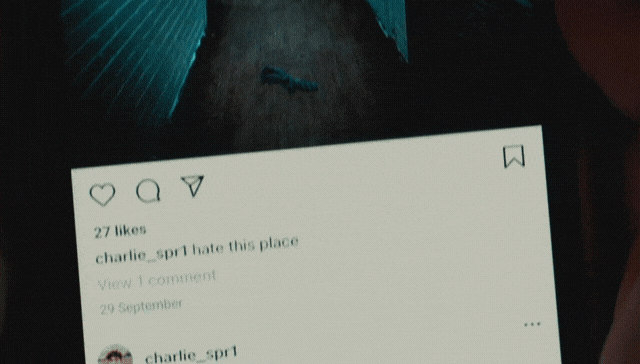
This triggers a flood of memories of comments Nick had heard made about Charlie around the time he was outed the year before. While it’s highly unlikely that Nick hasn’t thought about this at all in the time he’s gotten to know Charlie, perhaps it’s been mostly background noise, or at least somewhat removed from his own experiences with Charlie. After witnessing Ben’s psychological and physical assault on Charlie, these memories have new profundity, clarity, and a terrible nearness. And they bring with them some delayed and misplaced guilt; now that Nick knows Charlie personally, he knows he would have done something about the past bullying if he’d had the chance. This is the wholeness of understanding Nick wants, even if it is uncomfortable and distressing, and with it comes a pressing concern for Charlie’s well-being. Nick feels an intense need to check in, so he does.
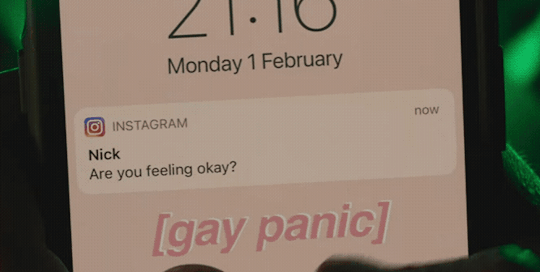
Of course it must be noted that Charlie made the virtual check-in leap first, after a bout of classic Charlie Spring overthinking. Justified overthinking in this case, since Charlie is highly aware that, immediately after he and Nick were pushed across boundaries in their friendship by the confrontation with Ben, he’s stepping over another line by adding texting to the mix. At the risk of getting a bit too meta, I’ll say this counts as an intentional, if virtual, touch. It’s a point of contact, reaching across the space between them, and though there’s an asynchrony to this form of touch, it’s still a new type of closeness for Nick and Charlie. It’s clear that they have not exchanged messages before, so by establishing this connection Charlie moves their communication from school-based and public to online and private. It doesn’t seem like a big deal on the face of it, but it is; it’s a pebble dropped in a pond that starts a flood.


Especially when Nick decides to reciprocate. Another thing we have to note here is that, in direct contrast to Ben’s rapid-fire, aggressive texts with Charlie, Nick gives Charlie time to respond. He respects that space between them, the room Charlie needs to emotionally maneuver and figure out how much he wants to tell Nick about Ben. Only when his uneasiness over Charlie's silence grows too great does he follow up on his original question, and even then, he continues to respect the space. He acknowledges Charlie’s right to keep things to himself, and simply offers a confirmation of his friendship, reiterating to Charlie that he is safe and trustworthy, and then leaving Charlie to decide on his own.

Charlie chooses to trust and share.
This new thread of connection snaps taut between them, and it never loosens again.
There now exists an increased ease between Nick and Charlie. When Nick invites Charlie to his house (ostensibly to meet Nellie), Charlie's posture is clearly relaxed and just slightly curled toward Nick, while Nick’s invitation is delivered easily and with no hesitation. Now, not only do they have private online conversation, they also have time together away from the social confines of school, time that belongs only to them. Another boundary is removed, that space between them narrowed just a bit more.
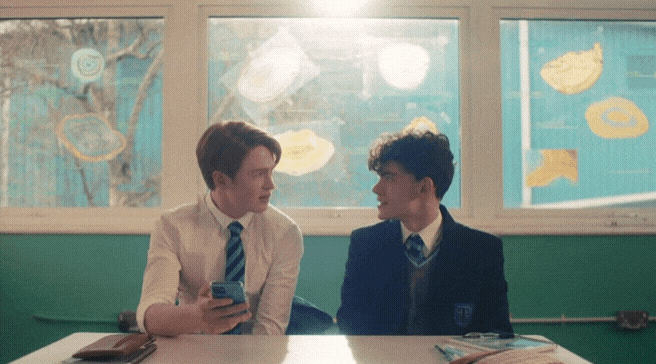
After requisite “hi”s have been exchanged and Nellie has been given the attention she rightfully deserves, Nick practically flings himself across the intentional touch divide. Charlie’s had a haircut (has he though? I’m with Tori on this one), and Nick reaches out, across the open doorway, to gently tug at Charlie’s curls. Charlie is obviously surprised, pleased, and a little confused. But this is a clear indicator from Nick, and a fairly clear acceptance from Charlie, that this kind of playful touch now falls within the bounds of their friendship. While there's a lot going on here for Nick as he realizes he does, in fact, notice aspects of Charlie's physical appearance and have strong enough reactions to them to both have and offer an opinion, he is not intentionally flirting with this gesture any more than Charlie is by asking nervously if the haircut is bad. Any flirting here is accidental or subconscious; they're still maintaining that caring respect for each other.


After Nick lists (just a few, it must be said) of Charlie’s positive qualities, Charlie mirrors Nick’s earlier playfulness with some of his own, covering Nick’s mouth with his hand and pushing him down on the bed. This could easily have become a more heated moment for Charlie, but it doesn’t, in part because Charlie is still incredibly conscious of the space required by their differing vantage points on the relationship. He uses only one hand, the other still grasping the video game controller and held down by his side; he looks at Nick's face only for a brief second before diverting his gaze; and he lets Nick push him off easily. Still, this is a freer Charlie than we’ve seen thus far, a Charlie who understands that, crush and romantic feelings aside, he’s found someone he can be himself with, and with whom he can safely express some affection, even if he has to keep the larger part of it concealed. Nick is surprised but responds in kind, equally playful with a huge smile and laughing “get off me!” (though notably slow to actually physically push Charlie away). His face clearly shows delight in witnessing a side of Charlie he hasn’t seen before, and these moments of casual but respectful touch have played a part in that.

Then comes the snow, and possibly the sweetest montage of the whole season. Here is a place where they can bring joy and easy openness into that safe, respected space between them. We get a glimpse of Nick brushing snow out of Charlie’s hair, shoving snow into the neck of Charlie’s coat, and flopping down to make a snow angel close enough to Charlie to brush his arm. Charlie’s delighted surprise is a little more nuanced, because the beginnings of hope are making themselves known, and there's a little bit of speculation in the way he views Nick's actions.


Despite Nick’s clear comfort with Charlie’s nearness (only Nellie separates them in this final scene, and Nick’s upper arm is crossed over Charlie’s while they talk in the snow), Charlie is still a bit more restrained—he doesn’t initiate much of this contact. He’s conscious of the fact that touch still means something slightly different, slightly more, to him than it does to Nick, so he generally allows Nick to choose when to use intentional touch.

While Nick’s conversation with his mom later isn’t about touch, I do think it’s there in the subtext. Sarah tells Nick he seems more himself around Charlie, so we have to conclude that she’s at least partly referencing the relaxed playfulness Nick experiences with Charlie (which is absent or at least different from his interactions with the rugby lads, with whom Nick is always aware, on some level, of the persona he is expected to present in that environment). Nick’s default setting is physical affection, but he’s been holding back all this time. With Charlie, Nick can let down his guard, trusting that the safe space they're nurturing between them, where they can see each other clearly and authentically, will allow Charlie to appreciate this essential part of Nick's nature.

The result—according to Nick, one of his favorite days, ever.
---
Much confusion and speculation about Nick's sexuality and romantic availability ensue among Charlie's friend group, causing Charlie to have extreme doubts about those stirrings of hope he felt while spending time with Nick. Nick immediately understands that something is wrong, and Charlie's highly uncharacteristic reticence toward him lets Nick know that whatever is wrong clearly has something to do with himself. He very deliberately puts a little extra space between them, trying to give Charlie room if that's what he needs, while also turning to face him a little more completely, opening himself up and communicating a willingness to listen. When Charlie still declines to talk, Nick, with his characteristic emotional intelligence, leans back in, removing that extra space, helping Charlie see that whatever's going on, Nick wants to understand it and, if he can, help fix it. Charlie, after an internal battle, briefly but decisively sets aside his doubts to ask Nick to come round his house. After all the drama and rumors, it comes down to just the two of them, as it always should have been, offering each other the space and support and patience they need to understand each other.


When Nick struggles in his attempts to play the drums, Charlie’s deeply buried but powerful self-confidence comes briefly to the fore and he tells Nick to budge up. He’s testing the waters here a little; by saying “let me help,” he’s still giving Nick the option to decline, but Charlie definitely isn't his usual deferential self in this moment. Nick does not decline; in fact, there is nervous excitement all over his face. Both of them are fully aware that they’re erasing that physical space between them—they’re pressed together from shoulder to knee—and they both agreed to be there.

Charlie takes Nick’s hands and guides him through a drum sequence, clearly focused and happy, in his wheelhouse for once, while Nick finally, fully realizes and admits to himself on some level that the kind of touch he wants to share with Charlie has changed. He can barely mask the confusion and exhilaration and little bit of fear that he’s feeling when Charlie stops playing and looks back up at him.


Then we have a very intentional removal of touch as Charlie recognizes that, maybe, this interaction affected Nick more intensely than Charlie, or even Nick, first thought it would. Charlie releases Nick’s hands and steps away, reinstating that safe space between them, giving Nick (and himself, really) a chance to assess how they’re both feeling. Nerves and uncertainty play a part in this, and Charlie is clearly a little concerned about appearing too flirty toward Nick, but by taking a step back he's also respecting that bit of fear and confusion he sees in Nick, trying to lessen it if he can.


And now we get to the most casually yet profoundly intimate scene thus far, as Charlie falls asleep on the couch while Nick watches a movie, both of them bathed in golden evening light and swathed in separate blankets, Nick much closer to Charlie's side of the couch than his own. Nick looks at Charlie with intensely confused longing—the first time he’s looking at Charlie when no one else, not even Charlie himself, can witness it—and wonders, what would it be like if this space between them was gone? What if he could be that close to Charlie?

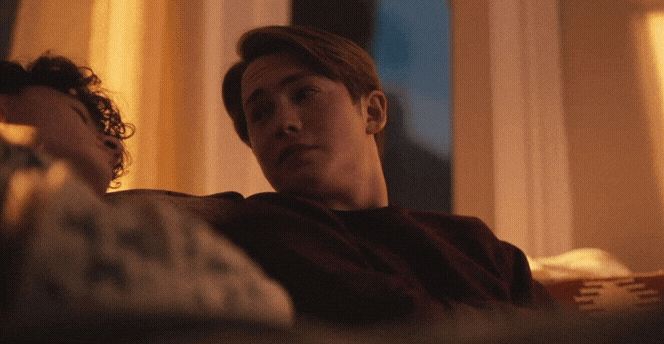
And here he tests himself—does he have the nerve, or even the self-understanding required to take Charlie’s hand? Is that actually what he wants? Nick bravely pushes himself to cross the divide and confront his new reality. When he hovers his hand over Charlie’s, the intent to actually touch is there, but it’s not quite enough to overcome the fear and follow through. Nick pulls away, once again retreating into the safe space between them to process the fact that he very, very much wanted to hold Charlie’s hand. This happens not once, but twice, as Nick essentially double-checks his own impulses to make sure he understands them, to make sure he does feel this way about Charlie. Nick's gaze takes in Charlie's whole face--obviously there's a thought about kissing somewhere in there, but Nick is considering the entirety of his relationship with Charlie, the intensity of his emotions toward and about Charlie as a whole person. The potential for a different kind of intentional touch is just the final piece of that puzzle.
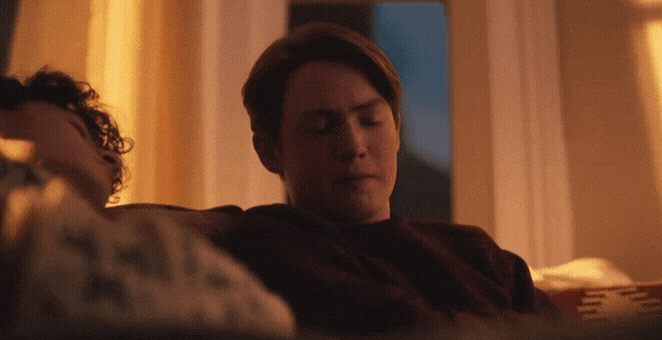
Now it’s late, quiet, and for all Nick and Charlie know they are, for the moment, alone (Tori’s lurking notwithstanding). There’s a sense, unspoken and shaky but undeniably there, that the tenor of their friendship has shifted. Charlie admits that he wishes Nick didn’t have to leave, a statement that, in a less charged setting would mean little. Here, though, it's a subtle admission of deeper feeling. Nick admits he would like to stay as well, and follows it up with a very telling line: “You look so . . . cuddly like that.” Lots of things are going on here. First, Nick is not looking at Charlie’s face for much of this exchange—he's looking at the rest of Charlie’s body. And this is only the second time Nick has commented on Charlie’s appearance; unlike when he notices Charlie’s haircut, here there is nothing obvious prompting this comment other than Nick’s own desire to voice his thoughts. Nick’s word choice is interesting, too. He could have said “cozy,” “comfy,” or some such. Instead, he says "cuddly," a word with connotations of both appearance and action, specifically reciprocal action. To say Charlie looks cuddly implies that Nick has thought about Charlie’s cuddlable-ness (not a word, but stay with me here). Combine that with the progression of the conversation—from admitting he doesn’t want to leave to telling Charlie he looks cuddly—indicates that Charlie’s cuddleable-ness is at least partly the reason Nick doesn’t want to leave.

Charlie, with all of his suppressed hope, tentatively picks up what Nick is putting down. “Do I?” really means, “did you mean that like I hope you meant it?” Nick responds with an emphatic “Yeah.” Then there is a pause while Nick holds a quick internal debate. Charlie waits, seeing clearly that Nick is struggling with something. As Charlie often does for Nick, he’s maintaining the space between them and allowing Nick to make his own decision about whether a meaningful touch is what he wants. This is one of Charlie’s most profound and consistent means of caring for and protecting Nick, and proof of how highly attuned he is to Nick’s conflicted emotions.


Nick comes to a clear decision and embraces Charlie for the first time. Charlie, unable to quite believe it and unsure of the meaning behind it, waits several beats to return the hug, giving Nick a lot of room to change his mind. And while Nick is clearly a bit panicked about his actions and their ramifications for him, while he is confused and scared, he intentionally, courageously chose this hug, this meaningful touch, as an expression of his deep care for Charlie.

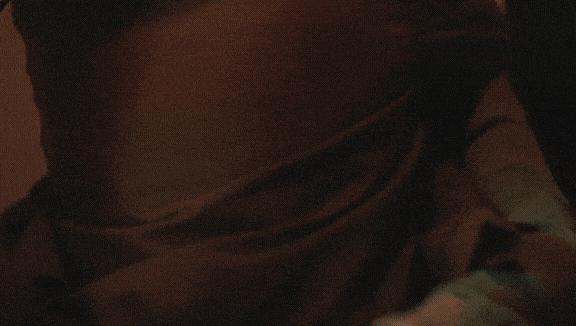
And this is when that actual physical space between them becomes intangible space. It is still there, still a vastly important part of their evolving relationship, but when Nick and Charlie are alone, that space is now held between their minds and hearts rather than in the tangible world.
#you made it to the end!#thank you for reading all my waffling#intentional touch part 2 of 8#or of 16?#heartstopper series#heartstopper#heartstopper netflix#alice oseman#osemanverse#nick nelson#charlie spring#narlie#nick x charlie#nick and charlie#heartstopper analysis#joe locke#kit connor#nick nelson and charlie spring
74 notes
·
View notes
Text
Literary Terms
Allegory. A kind of story that has a meaning deeper than its obvious one, and it’s a sort of extended metaphor. A famous example is Bunyan’s "The Pilgrim’s Progress", which ostensibly tells the tale of the journey of its protagonist Christian, but has a symbolic meaning that describes the journey of a Christian from Earth to Heaven. In Medieval times, allegory was commonly used to communicate religious messages, but later it became a way of commenting on politics or society. "Gulliver’s Travels" by Jonathan Swift and "Animal Farm" by George Orwell are both examples of allegories that use bizarre stories as parallels for real political and social situations; Swift was commenting on everything from particular politicians to entire countries, while Orwell’s tale reflects events in the run-up to the 1917 Russian Revolution.
Aside. A device that has been used in plays for centuries, involving a character directly addressing the audience without the other characters being able to hear. It’s part of the story, usually kept brief and often used comically to gossip or make a comment about another character behind their back. Some films make use of this technique too, with a character looking directly into the camera to address viewers, known in this context as ‘breaking the fourth wall’. This is something "Amelie", the eponymous heroine of the French film that bears her name, does frequently by whispering conspiratorially to the audience.
Litotes. Understatement used for rhetorical effect, and usually makes use of double negatives for emphasis. For example, rather than stating overt enthusiasm for something, one might say that it was “not bad”. Another example might be “He’s not unintelligent”, as a means of saying that someone is intelligent (or even a genius). While understatement might at first seem a peculiarly British trait, the use of litotes is common in a number of European languages, and was a strong feature of Old English poems and Icelandic sagas. There are also instances of its use in the Bible, and even as far back as Homer’s epic "The Iliad", in which Achilles is described by Zeus as “neither unthinking, nor unseeing”.
Pathetic fallacy. A literary device in which human emotions are attributed to aspects of nature, such as the weather. For instance, the weather can be used to reflect a person’s mood, with dark clouds or rain present in a scene involving sorrow. It’s a form of personification. A novel that famously makes use of pathetic fallacy is Wuthering Heights, by Emily Bronte, the stormy characters and tumultuous relationships of which are reflected in the novel’s setting: the bleak Yorkshire Moors. Ferocious thunderstorms mirror Heathcliff’s aggression, and elsewhere reflect the turmoil Cathy must go through in choosing between Edgar and Heathcliff. Pathetic fallacy is even present in the name of the novel, which is also the name of the farmhouse in which the story is set; the word “wuthering” refers to wind so strong that it makes a roaring sound, or to a place characterised by wind that roars. Such threatening weather is used to create a sense of foreboding, forming a menacing backdrop to a story populated by characters whose violent and jealous temperaments are hugely destructive to themselves and others.
Stream of consciousness. This literary technique describes a character’s interior monologue (a continuous flow of thoughts going on in the character’s mind). It’s a technique that came to the fore in the 20th century, famously championed by Virginia Woolf in "To The Lighthouse" and, more bafflingly, by James Joyce in his groundbreaking novel "Ulysses", in which the idea of a stream of consciousness is taken to its extreme. Trying to represent the randomness of human thought processes literally, Joyce penned paragraphs like this: “My missus just got an. Reedy freckled soprano. Cheesparing nose. Nice enough in its way: for a little ballad.”
More: Word Lists
#literature#poetry#writing#writers on tumblr#writeblr#poets on tumblr#writing prompt#creative writing#writing reference#langblr#studyblr
75 notes
·
View notes
Text
For @dragonprincedrabbles generator prompt: Soren + Terry, "Vague." Ostensibly.
—
"It was around here," Terry said, looking carefully at Soren. "Somewhere. I think."
Early morning sunlight crept slowly into the Valley of Graves, where King Ezran inspected progress on the monumental wall relief that would honor the three archdragons who'd given their lives to stop Aaravos, for however small a handful of years. Four, if you counted Avizandum—he may not have technically been alive, at the time, but Soren knew Zubeia would have wanted him included.
"It's hard to tell, without the dragon bones. They were a pretty prominent landmark, at the time." Terry put his hands on his hips, turning away to survey the area with a critical eye. "Kind of weird to see the place without them, actually."
Queen Janai had declined King Ezran's offer to repatriate Sol Regem's remains, so the skeleton had been disassembled and carted away under guard to Queen Aanya in Duren. She and King Ezran were constantly exchanging letters about ongoing projects with names like "Ruby Fire" and "Solar Flare." The Crownguard's first and only concern was the safety of the ruling monarch, so Soren didn't give it any more thought than that.
It wasn't like he had any standing to do more than silently worry, anyway. Opeli and Corvus were always fretting over things like the King's state of mind, which plans he might later regret—even his relationship with his brother, still fractured months later, with no sign of future repair.
Callum might not have been on the wrong side like Claudia, but Soren could see the glimmer of her furious pride, in him. Her fierce, unquestioning love. Her obsession. All the things that, when it came time for her to choose, had made her choose wrong. Over and over and over again.
"I might still be able to find it, in the ground," Terry added, looking back at him. "It depends on how many other skeletons are down there."
"Okay, I'm gonna need some context on this one, Super Salad," Soren replied, pulling one arm across his chest to stretch out his shoulder. "Find what?"
"The spot where we—where Claudia and I buried your dad."
Soren froze mid-stretch. He'd looked for Viren's body in the ruins of the castle, because of course he had. Why wouldn't he? His father had died more than once, already—it was only sensible to want confirmation that he was well and truly gone, this time.
They'd pulled bodies from the rubble for days, and Viren's hadn't been among them. Neither had they found the staff, until it reappeared in Claudia's hands at the Moon Nexus.
"She told me Katolians usually burn your dead, but we didn't have the time or materials to prepare the body for that," Terry continued, sheepish. "So I helped her dig the hole, and she built a little cairn to mark it. The stones probably got scattered during all the fighting, later on."
Soren had lost his father more times and in more ways than he could count—nearly as many as he'd lost Claudia. He would have thought it'd stop hurting, by now. A grave for those losses shouldn't mean anything at all.
Terry looked out over the Valley again. "I just thought you might want to know. Maybe put up a better marker."
Soren grimaced—he'd held the shoulder stretch well past the twenty seconds his stretching routine demanded, throwing everything off. He squinted up through the sunlight at the rough forms taking shape on the memorial wall. King Ezran was engaged in an animated discussion with the lead architect, who appeared to be having some kind of dispute with the Sunfire elf mages over the engineering of the monument's eventual ever-burning flame.
"Yeah, well," he said, switching arms to stretch his other shoulder. He didn't look at Terry. "I didn't."
#did i have this idea and then spin the prompt generator until i got one that worked for it? .................. maybe#is that against the rules? not at all#the dragon prince#kradogsfic#terry#soren
22 notes
·
View notes
Text
Life after NDE

Before reading, please see this post. It’s where I first explored the possibility that what we think we know about One for All is unreliable. It also ends with my own guesses about how Katsuki plays into it all. Now, with chapter 404, I can continue where it left off.
There are a lot of different tangents floating around here that I need to bring together for you, so let’s start with what came to light in this newest chapter. There’s a clear emphasis on Toshinori’s vestige form:
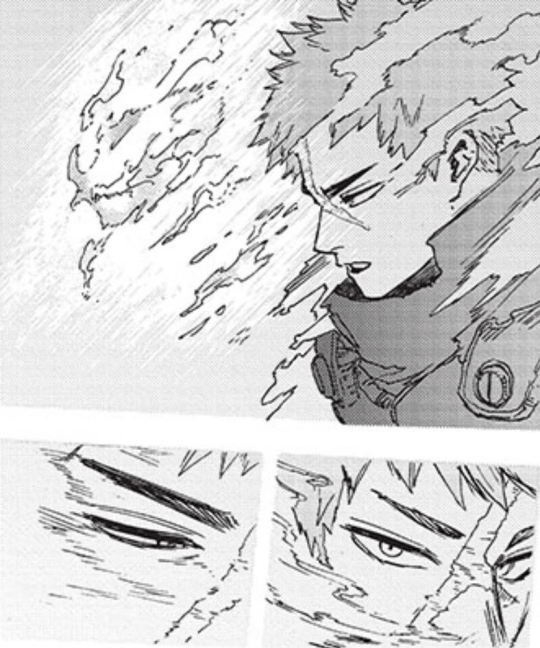
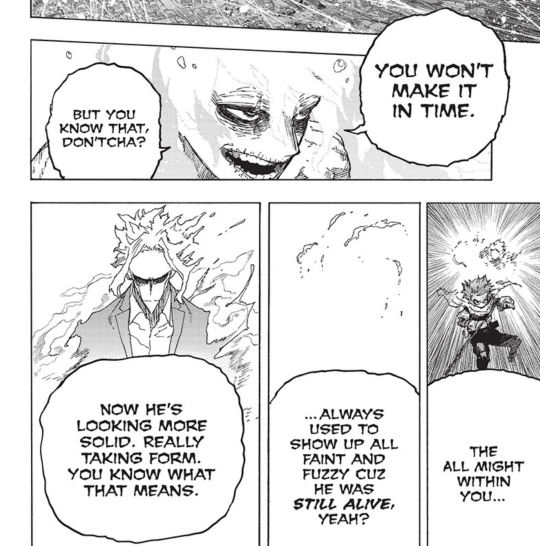
but did you catch the slight of hand?
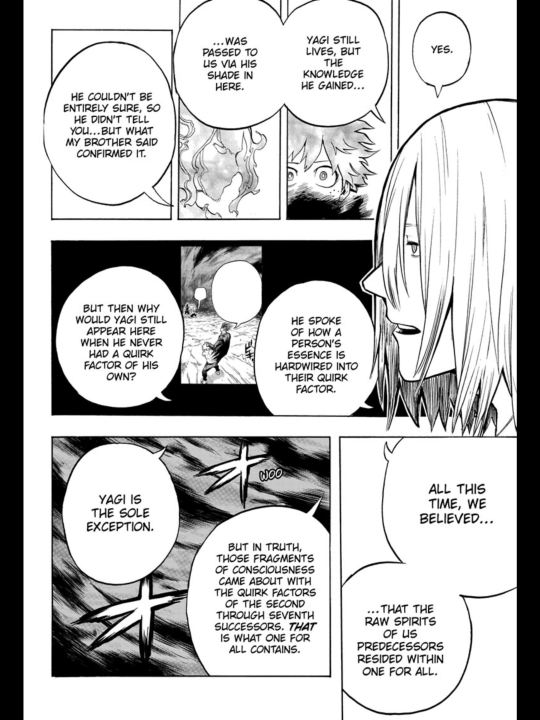
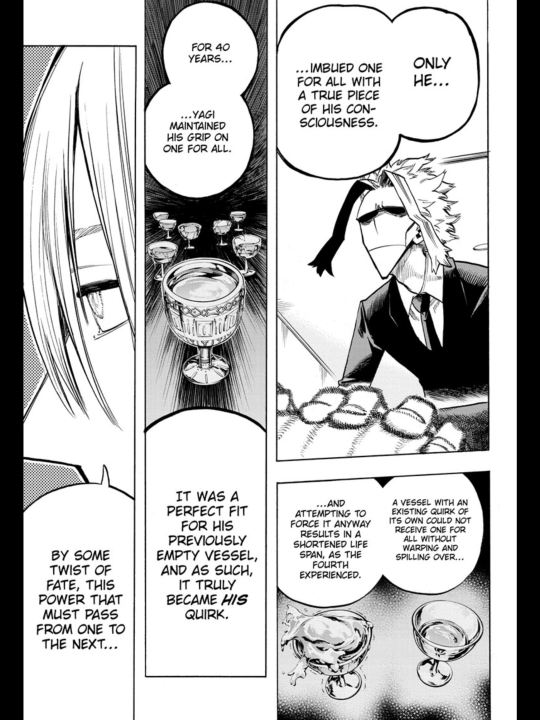
How about now?
As soon as I saw the panels where Shigaraki talks about how the vestige is taking full form, I was practically shouting “OBJECTION” Ace Attorney-style, because they were a complete contradiction to how we were made to understand vestiges in chapter 304 (oh hey look, exactly 100 chapters ago!). Back then, it was suggested to us that Toshinori was special because of his quirklessness, that it allowed him to imprint upon OFA in a way that none of the other previous users could. In contrast, Shigaraki makes it seem like Toshi is no different from the rest. Like oh yeah, this is just how it works, they aren’t fully formed until they die, right? Hello?? No? I thought we were assuming the vestiges didn't have to do with actual souls, apart from Toshi? Given Shigaraki’s own brand of unreliability in his immature frame of mind, I found myself wondering: is he making an assumption, or is he letting slip a secret bit of information about OFA? Idk man, OFA wasn’t even doing this whole vestige thing until like a few months ago, so.
Either way, we can observe the change. As Toshinori’s lifeforce fades, he appears in OFA. I’m left with the simple observation that if he were truly different from the other vestiges because of his quirklessness, it would not have happened this way, since OFA doesn’t have Toshi’s own unique quirk factor to work with, but rather the other way around. You would have expected his vestige to stay the same, or possibly disappear altogether, since it was ostensibly exclusively based on the influence of a living consciousness.
That exception to the rule described in 304 never sat right with me anyway, and I’m not convinced that OFA contains mere memories of its previous users via their quirks just like AFO does. Sure, it’s nice and edgy to imagine that OFA/AFO are more similar than they are different, deep down. But poetic opposites are more interesting to me: AFO isolates by taking, while OFA connects by giving. Previous OFA users give themselves to their successors. One for All was “truly born” not when All for One tossed Yoichi a stolen consolation, but when 2nd extended his hand. There is something distinctly emotional and personal about that. Nana was right—it is kinda romantic.
Because Toshinori kept living, because Izuku has meaningful relationships, that chain of giving linked down through OFA was finally brought to light, like a circuit that’s being closed. At least, that’s how I see it. That’s pretty much what I talked about in my previous post.
Back then I also suggested that this theory of personal connection in some way explains Katsuki apparently having a vestige. Since chapter 403, where Toshinori describes his legacy as being embodied in both Izuku AND Katsuki, I was reminded of how Toshinori was gradually shown this over the course of the manga, as he came to understand Katsuki and his relationship to Izuku, how they are inseparable.
When Toshinori was inspired to pass OFA on to Izuku as he witnessed him trying to save Katsuki, he had no idea the two boys even knew each other. What he saw as a random act of selflessness was in reality a desperate manifestation of a connection that extended beyond memory, of osananajimi. With the eyes of traditional heroism, one could choose to see this as Toshinori’s fatal mistake, that he accidentally chose a successor with a “weakness” of personal attachment, but we all know that heroic isolation isn’t all it’s cracked up to be. No, I think Toshinori made precisely the right choice.
This is going to seem like it’s coming out of nowhere, but bear with me: you know how we still haven’t been told how the first OFA transfer happened? I feel almost silly admitting this, but I think it absolutely had to have been done instinctually, because it’s just too damn specific. As in, they didn’t know what they were doing or what it would accomplish, but they did it anyway. As in. They moved. Without thinking.
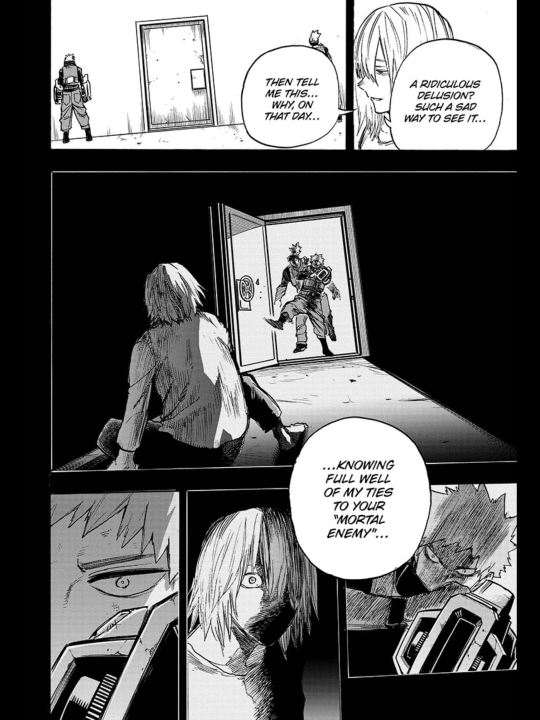
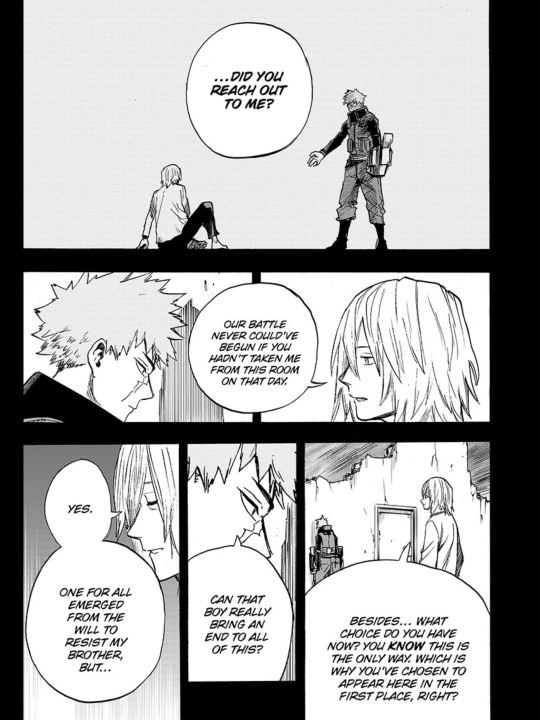
Toshinori didn’t fully consciously understand what he was seeing when Izuku ran to Katsuki, but deep within OFA, perhaps he recognized something familiar.
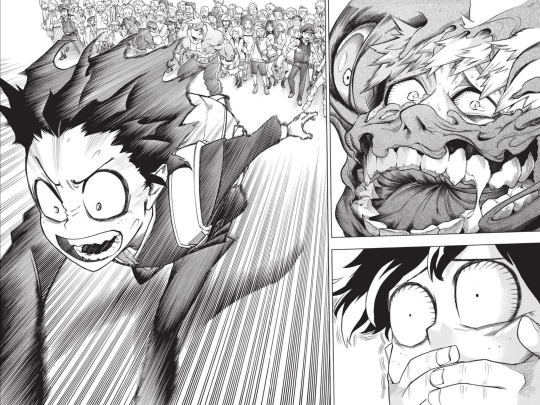
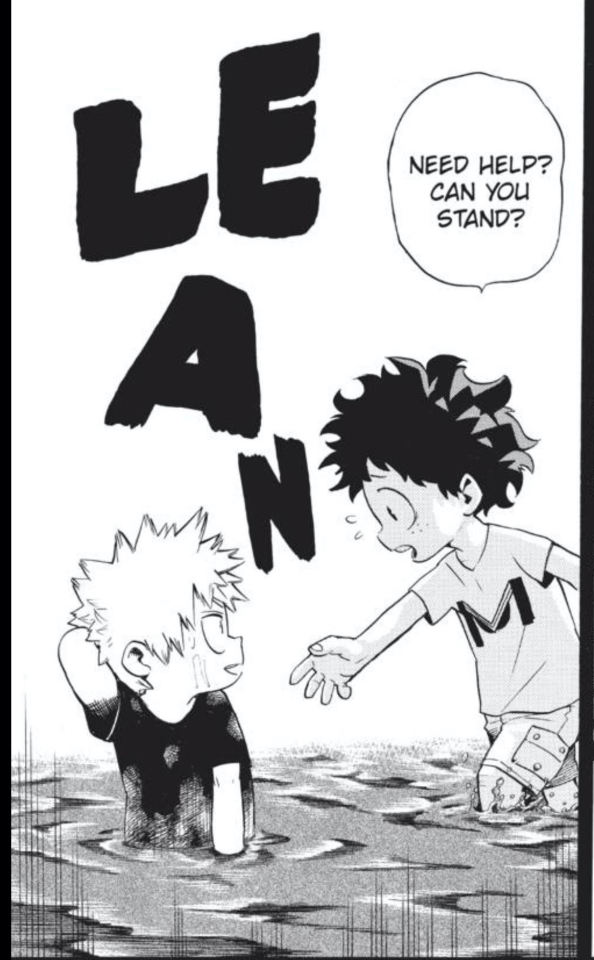
What if, somehow, without knowing it, Toshinori gave One for All to two people? His conviction and intent to give it was inspired by Izuku’s connection to Katuski. Yes, the transfer is inherently physical, but it also relies on mental assertion. Plus, how we think the transfer works may also be an assumption (again, the first time it happened was probably on instinct). Let me break it down even more: Toshi probably thought, as he passed OFA on, “I’m giving it to a successor who has my same balance of heroism—save to win, win to save.” But, in reality, Izuku relies on Katsuki for that balance, as his image of victory. Therefore I think I can argue that their relationship is irrevocably bound within the pact of the OFA transfer. Maybe because Katsuki’s part of OFA is based on emotional connection, once that connection is reciprocated…

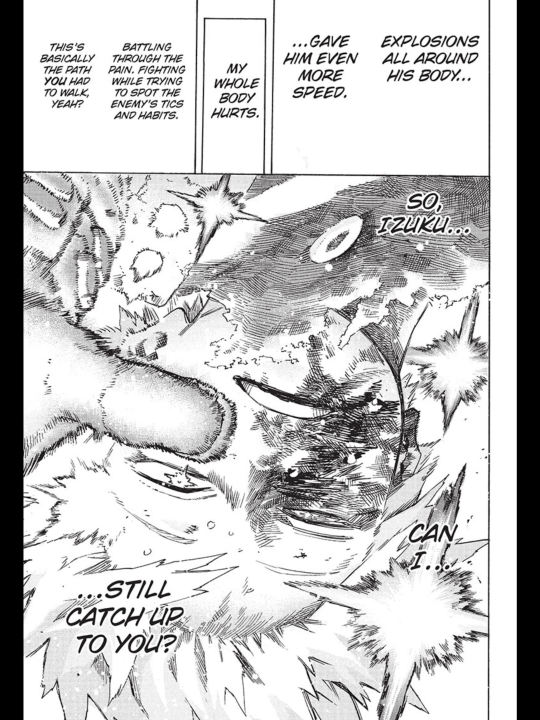
…the full extent of that dual transfer is awakened.
I understand I’m making a lot of logical leaps here, but there has to be some sort of explanation for the Katsuki we see at the point of his death, talking to Toshinori’s vestige. I used to think it meant Katsuki had a vestige too. But then why are Katsuki and Toshinori alone, and without Izuku knowing? Moreover, why didn’t Katsuki materialize from the metaphysical mist around Izuku when he died, just as Toshinori did here?
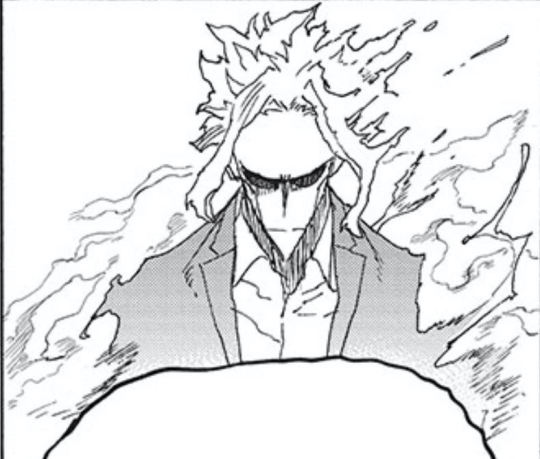
Here comes the other thing I realized in 404. The simplest explanation may be that Katsuki isn’t a vestige at all, but rather he was visiting the OFA interior just as Izuku has done in his sleep or in a coma. Because he’s not a previous user, he’s a current user. The sequence of Toshinori’s NDE (near death experience) in 404, the way it manifested externally around Izuku as something Izuku was aware of, rather than internally within OFA from Toshinori’s point of view, shows me that what happened to Katsuki was different.
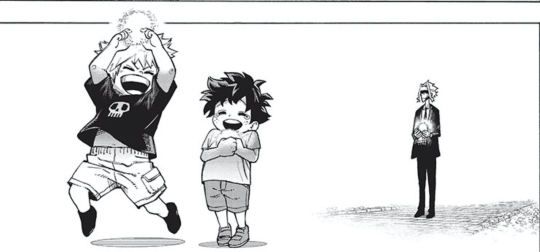
A lot of us have been speculating that Katsuki “has access to” OFA in some form or another for quite some time now, but I think the way the idea is suggested in 403/404 is an important distinction because it specifies the mode of connection. To me, it matters that they have two halves of a whole given to each of them, as opposed to, “the chosen one + his sidekick with a little extra OFA boost.” This puts them on equal ground, and it implies that the closer they become, the stronger One for All will be against All for One. It promises that these two idiots who have been toeing around each other and leaving things unspoken for so long will have to really face the facts of their relationship.
One last thing: you might be wondering why the other vestiges apparently haven’t picked up on what’s going on and told Izuku. Well, Yoichi may have felt it? (Where has he been?) But also, Toshinori is the only one directly involved, the only one who realizes his legacy is carried by two. Up until this point his connection to his vestige self has been limited, sort of one-way. For example, he could tell the other vestiges about his research into OFA, but in return he could only faintly pick up on things, and only while Izuku was unconscious.
The time Toshinori spent as a full vestige was brief, but I’m sure it was enough to learn some things about where the shade of himself has been. Even if I’m wrong about everything else, I bet he can give us the answers now.
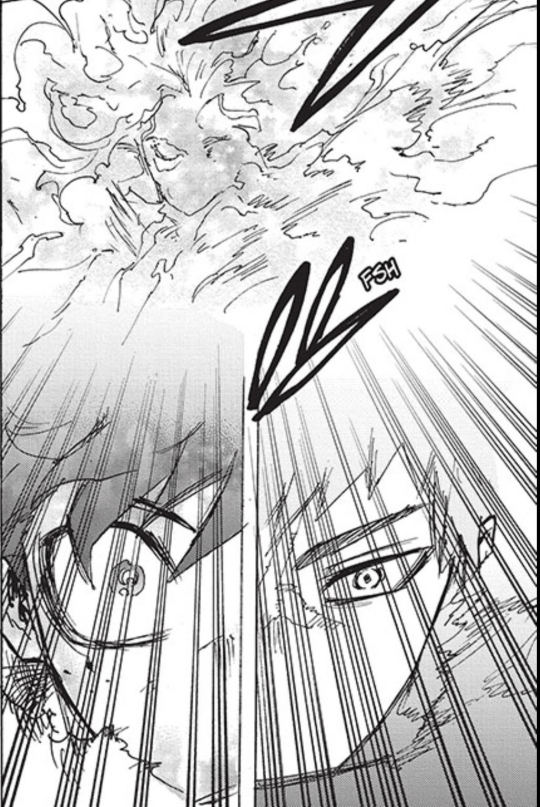
#bnha 404#bnha 403#mha#bnha manga#my hero academia#boku no hero academia#all might#yagi toshinori#midoriya izuku#Bakugou Katsuki#bkdk#bakudeku#dkbk#dekubaku#lin speaks#meta
202 notes
·
View notes
Text
Anticipating the ending of The On1y One, I've been remembering an interview with director Celine Sciamma about Portrait of a Lady on Fire. She said,
"The ending of it is really climaxing. Because when we watch love stories, it’s harder, the frozen image of two people leaving in a car, you know, marriage, whatever. Like the romantic-comedy ending where they end up together, then that’s the end. Eternal possession as a promise of fulfillment. Or, it’s the tragic ending, where they will never [be together]. And I really tried to find another way... It’s a love story about emancipation. And that’s so much what we’re trying to tell: it’s not about whether you end up together, or you don’t. A good love story isn’t about that, it’s about: did it give you emancipation?"
Both Portrait of a Lady on Fire and The On1y One are about queer memory and history. While one is about recovering the distant past and the other is about the past of adolescence, they each lean firmly into the ambiguous spaces of what could and couldn't be articulated. How does a work simultaneously acknowledge the potential queer feelings and relationships from our pasts alongside the limits that impacted people's ability to come-to-terms and act on those queer feelings?
So many queer plot pieces of The On1y One are left unresolved in the last episode, and it's important that we look at that as intentional. It's a disservice to a show so deeply passionate about poetry to read its narrative from a straight forward perspective. It's filled with symbols, patterns, and gestures instead of a generic plot structure. @toastofthetrashfire wrote about what we might make about the symbols of circular and linear time regarding Jiang Tian and Sheng Wang, and I think consideration of those themes ought to be applied across all the plots that mount up into irresolution at the end. Jiang Tian's history of neglect and abuse at the hands of his closeted father, the disruption of queerness into the teachers' intense platonic friendship, and, of course, Sheng Wang's young gay panic: how do we incorporate these failed models of behavior into our queer timelines? How do we offer the potential of freedom and mercy to our recollections of them and our imperfect past decisions?
We have to believe in potentials and futures that didn't necessarily arrive for them. The last image we get in the series is that ellipsis of belief, moving us forward without truly moving. We return to the image of the glass pitcher filled with mint lemon water, whole again, at least for now, and we hear a promise from Sheng Wang to come back. It's ostensibly a promise to return to Class A for Jiang Tian, but it speaks to the desire to revisit the our past and to let it revisit us in new forms, the way you're meant to return to a poem or the best books, not to recall an end you forgot or to memorize it's every line but to be moved.
#the on1y one#just so thrilled to see so much discourse around the end of this show#for a multitude of reasons#i just like seeing shows within the BL world like this one and Only Friends explore ambiguous meaningful endings
35 notes
·
View notes
Note
I don't think player-centric sexuality can be criticized without criticizing male-as-default. Even ostensibly gender-neutral protagonists will be treated as male if the writer setup a scenario that can only work if the protagonist is A) male and B) alienated from women the way a straight man would be. But even still, a lot of assumptions about the audience are built in. Things like gacha or harems having a majority of female characters to collect confessions from, with the minority of male characters being aloof and professional. 1/???
In Snowgrave we force Kris & Noelle into specifically ungendered roles. Noelle is the mage, the girl, soft & malleable - she's also the offense & the stoic one in the face of calamity. Kris is the knight, the human, the commander - they're also Noelle's support & the one who calls for help throughout the route. But I don't think "Snowgrave Kriselle is heterosexual" overrides that. Like, throughout the Weird Route we pigeonhole Kris & Noelle into a pair of functional but imbalanced & codependent roles, isolated from everyone else, and naturalize it through ideas of Love, Marriage, & responsibility. Is that not related?
look, I'm going to be direct about a doylist aspect here that I haven't wanted to bring up as strongly because I didn't want to just come off as snarky: I don't think toby fox, who I suspect accidentally stumbled into writing nb characters to begin with and who has been consistently kind of bad about it, is deliberately writing anything about male as default or the horrors of misgendering. further, i don't particularly want to keep reading people finding reasons to call Kris male in terms of story roles or whatever, because it feels bad and I think people are way too quick to go to male as default.
i do think a lot of what "default RPG protagonist" entails closely overlaps with a heterosexual male view of the world (god knows I've talked w people about the quiet lesbian amusement when a game has a character creator but still has all the women fawn over you), and I do think that has bled into deltarune's critique; toby fox writes a stock RPG romance gone wrong, and that involves the bashful healer girl (who is none of those things) and the strong-willed protagonist (who is none of those things). but i just think reading Kris' role in it as "male" isn't quite how I take it, beyond the background radiation of the world where anything neutral or null will lean male.
snowgrave brings in signifiers of marriage like the rings, and then has them treated as flat objects to be given for bonus affection and better stats. there's no actual bond formed between Noelle and Kris by them giving her a ring, and in fact one ring is traded for another even worse one the second that becomes possible. the relationship is reduced down to equipment and grinding and saying the correct things in the correct order. it's a critique of the flatness of relationships in video games first and foremost, and I think the ways it feels heterosexual are mainly just background radiation
#snowgrave /#misgendering discussion#tldr: i dont think this is what toby is going for and also i dont think we need to call kris male coded to make analysis work.
29 notes
·
View notes